

World Indoors 2024
12 Page Section
www.scottishathletics.org.uk
official magazine for members of scottishathletics 2024
£3.75
The
PB Issue 1
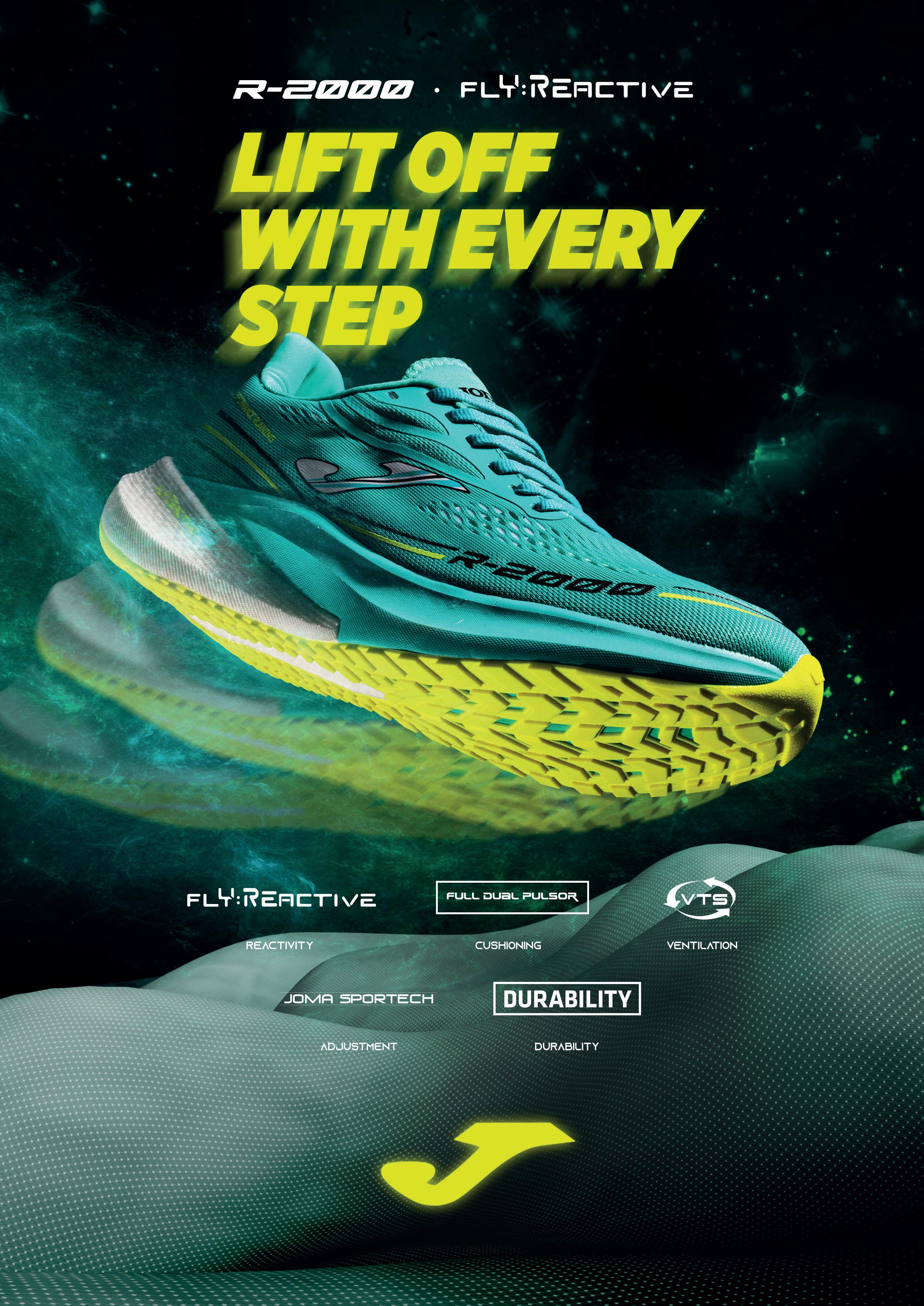
joma-sport.com




Glasgow
Glasgow
Glasgow 2024 Josh
Glasgow
Glasgow
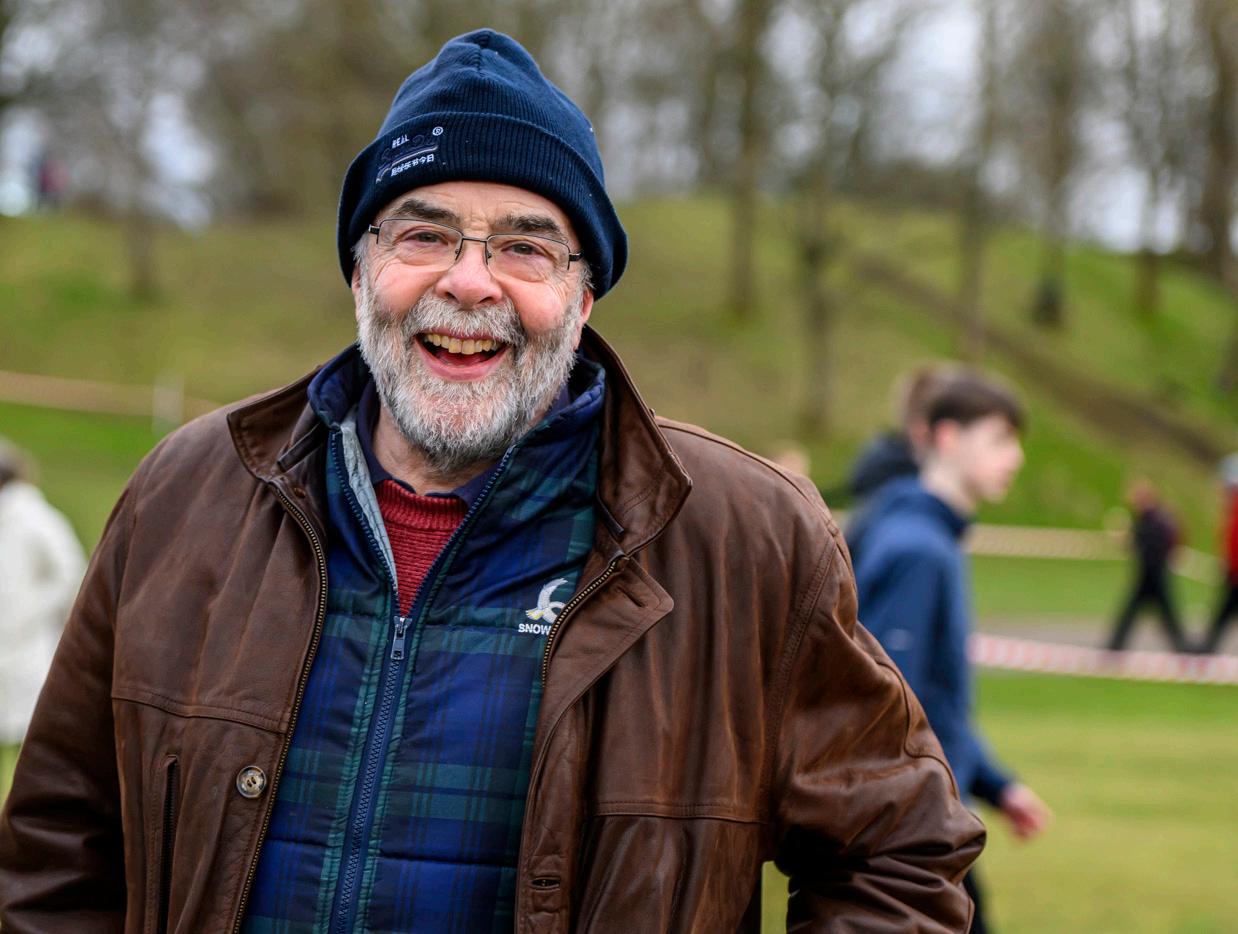


in this issue... The official magazine for members of scottishathletics www.scottishathletics.org.uk PB2024 Issue 1 Contacts Chair David Ovens News Josh checks out Paris News Cram: Clubs are Key Lindsays National XC Falkirk PB Interview Eilish McColgan
Arena Glasgow 2024 12 page Special
Emirates
Reekie
2024 Jemma
Muir
2024 Laura
Kerr
Officials
2024
2024
McKean
2024 Reflections Grassroots Athletics Larkhall YMCA Grassroots Athletics Women’s Running Grassroots Athletics High Jump Grassroots Athletics Andrew McGill / Frank Clement Grassroots Athletics Steve Adam Eric Liddell Paris 1924 04 05 06 07 08 12 14 15 16 18 20 22 24 26 28 30 32 34 36 38
Tom
Glasgow
Photos: Bobby Gavin, Mark Shearman, Jeff Holmes, British Athletics/Getty Images, Jamie Simpson, Giffnock North AC, Larkhall YMCA, Eilish McColgan, England Athletics
Contributors: David Ovens, Katy Barden, David McCarthy, Arnold Black
Advertisers: Lindsays, Joma, Kilmarnock Harriers, Athletics Trust Scotland, Glasgow Life, Babcock 10k, Project: physio
Interviewees: Josh Kerr, Jemma Reekie, Laura Muir, Jame Crowe, Alice Goodall, Scott Stirling, Tom McKean, Lorna and Lesley Rogers, Carol and Rebekah Rose, Andrew McGill, Frank Clement, Steve Adam, Freya Ross, Sandra Hardacre, Allan Smith, Matthew Tait
Clubs: Livingston AC, Larkhall YMCA, Carnegie Harriers
FRONT COVER PHOTOS: Jemma Reekie is a hit with youngsters after winning silver at the World Indoors in Glasgow as (inset) Josh Kerr celebrates Men’s 3000m gold. Photos by Bobby Gavin.
CONTENTS PAGE
PHOTO: Alice Goodall celebrates her win in the Senior Women’s race at the Lindsays National XC at Falkirk (photo by Bobby Gavin)
07885 868164
Alasdhair Love Head of Competitions 07584 146 796 alasdhair.love@scottishathletics.org.uk
Allan Scott National Manager Sprints, Hurdles & Relays 07824 015 392 allan.scott@scottishathletics.org.uk
Carol Robison Membership Administrator 07391 845 783 membership@scottishathletics.org.uk
Colin Hutchison Chief Executive 07983 080 925 colin.hutchison@scottishathletics.org.uk
Dawn Allan Head of Operations 07983 080 922 dawn.allan@scottishathletics.org.uk
Lindsay McMahon National Club Manager 07918 796 648 lindsay.mcmahon@scottishathletics.org.uk
Mark Pollard
Head of Performance 07584 102 980 mark.pollard@scottishathletics.org.uk
Peter Jardine Head of Communications 07885 868 164 peter.jardine@scottishathletics.org.uk
Ross Mackey Finance Administrator 07801634198 nance@scottishathletics.org.uk
Allan Hamilton National Talent Manager 07597 577 915 allan.hamilton@scottishathletics.org.uk
Sam O’Kane National Field & Combined Events Manager 07743 928 626 sam.okane@scottishathletics.org.uk
Robert Hawkins National Endurance Manager (Olympic Pathway) 07903 179 875 robert.hawkins@scottishathletics.org.uk
Shona Malcolm-Martin Of cials Development Of cer 07731 832 567 shonamalcolm@scottishathletics.org.uk
Morva McKenzie Welfare Of cer 07983 081 122 morva.mckenzie@scottishathletics.org.uk
Pamela Robson National Disability Pathway Of cer 07827 343 410 pamela.robson@scottishathletics.org.uk
David Fallon Head of Development 07960 582838 david.fallon@scottishathletics.org.uk
Sophie Allan Competitions and Business Administrator 07522 556771 events@scottishathletics.org.uk
Laura Kirkland Coaching administrator coaching@scottishathletics.org.uk
Fran Snitjer Executive Of cer and Equalities Of cer 07584 146 795 francesca.snitjer@scottishathletics.org.uk
Jamie McDonald National Club Manager 07776 370 199 jamie.mcdonald@scottishathletics.org.uk
Angela Mudge National Endurance Manager (Off Track Pathway) 07739 506786 angela.mudge@scottishathletics.org.uk
Caitlin Watt Competitions Manager 07718 526 373 events@scottishathletics.org.uk
Alison Grey Coaching Co-ordinator & Throws Co-ordinator 07739 506 733 alison.grey@scottishathletics.org.uk
Lisa Turner Welfare Administrator 07393674262 pvg@scottishathletics.org.uk
Jo Stevens Jog Scotland Membership Development Of cer 07903 180 453 jo.stevens@scottishathletics.org.uk
Julie Mollison Head of Coaching Development & Talent 07818 592 639 julie.mollison@scottishathletics.org.uk
Lorna White Welfare Of cer 07729 045461 lorna.whyte@scottishathletics.org.uk
Stephanie McLean National Community Impact Manager 07756 883246 stephanie.mclean@scottishathletics.org.uk
Chandler Richardson National Community Impact Of cer 07743 928625 chandler.richardson@scottishathletics.org.uk

Aro Resources
At the time of writing this column, the World Indoor Championships have just finished in Glasgow and we are celebrating another set of fantastic performances by the Scottish athletes involved, who are now proving themselves to be consistently amongst the very best in the world.
Mondo Duplantis, Femke Bol and Noah Lyles were among the superstars on display but sitting very firmly alongside them as part of the world elite were Josh Kerr, Jemma Reekie and Laura Muir. All three put in stunning performances to lay strong markers down on the road to Paris.
But for injury and illness, there could have been a whole host of other Scots in Glasgow and we would certainly hope to see them in Paris, and in contention for medals.
Jake Wightman, Eilish McColgan, Neil Gourley and Zoey Clark, to name a few, have been struggling with injuries, but are now hopefully on the road to recovery as the Olympics loom on the horizon.
At the top level of athletics, the difference between a podium place and injury can be a very fine line.
In 2022, for example, Jake Wightman was on top of the world, securing the gold medal over 1500m in Oregon. Yet only a few months later, he suffered a stress fracture and is now building gradually back to fitness.
Likewise, who could forget Eilish McColgan’s stunning summer in 2022, and particularly that incredible gold medal in the 10,000m at the Commonwealth Games? Yet her last year has been blighted by injury. Eilish is now patiently working her way back to peak fitness.
Zoey Clark went from the highs of celebrating a stunning bronze medal as part of the Women’s 4x400m squad at the Commonwealth Games in Birmingham, to the lows of a serious back injury from which she is gradually recovering.
Neil Gourley won silver at the European Indoors and the World Indoor GP title early in 2023 to secure a spot at the World Indoors in Glasgow only to be unable to take his place due to injury.
The moral of these stories is that to perform at the top level requires a great deal of resilience and patience to deal with the obstacles life can throw at you.
 David Ovens Chair Scottish Athletics
David Ovens Chair Scottish Athletics
@SALChiefExec
Self-belief is taking Scots to top of the world –and they set a brilliant example
Neil Gourley missed World Indoors through injury but he still made visits home to his club, Giffnock North AC, a priority
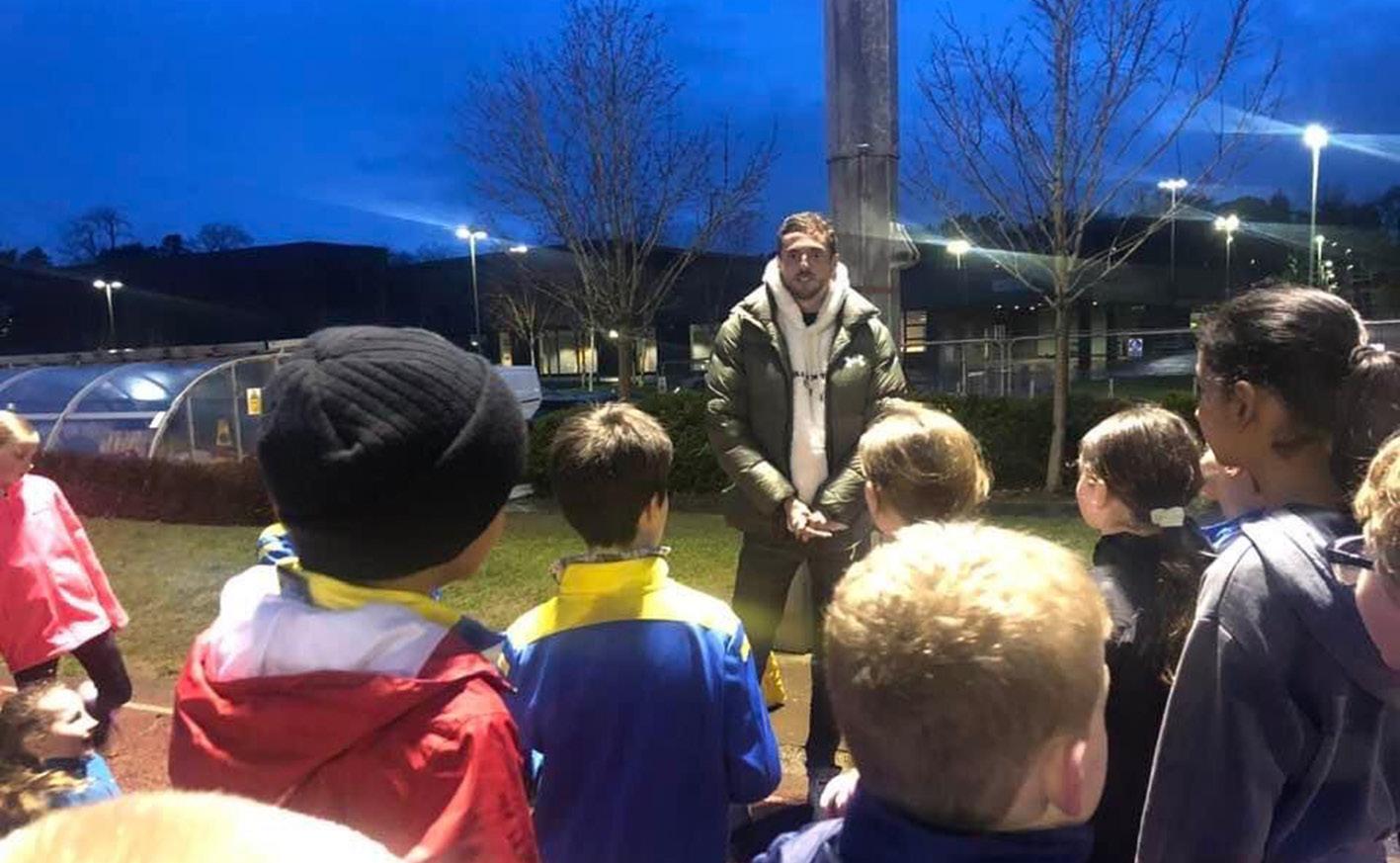
There are as many troughs as there are peaks and building back up to the peak requires resilience and a strong support system. It also requires a great deal of self-belief. Fortunately, we have a generation of athletes representing Scotland at the moment who have no shortage of self-belief.
It was pleasing to see many of our young athletes at the World Indoor Championships, cheering on our Scottish and British athletes (as well as a host of international stars) and being inspired by the great performances.
Many of them will aspire to be part of the next generation of great Scottish athletes, and there is no reason why that won’t be the case.
They have an abundance of amazing role models who have proven that hard work, determination and self-belief are the ingredients required to make it to the top.
On their own journey, our young athletes too will learn to deal with adversity and to develop resilience and patience.
In a similar vein, we are in a period where our athletics community in general has to be resilient.
Amidst all of the great performances we are seeing from elite to grassroots, there are challenges. Protecting our key facilities is the biggest one and Scottish Athletics is working hard to protect our core facilities such as Grangemouth, while also planning for investment for the future. Not all of this is in our control.
However, we will continue to make the case consistently and vociferously so that local authorities and government engage and respond. Yes, funds are tight, but it would be a false economy to allow the fabric of our sporting facilities up and down the country to deteriorate and to close.
Whether it was in Edinburgh, Aberdeen, Giffnock or Dundee, our current crop of world class athletes were able to access local club facilities at the start of their athletics journey.
The pathway to elite starts at the grassroots. We must ensure that the current generation have the same access to good quality facilities that Jake, Jemma and Laura had when they were starting out.
Otherwise there is no legacy.
5 scottishathletics
Chief Executive David Ovens
Josh makes secret trip to Paris

Josh Kerr went to Paris at Christmas to give his Olympic medal daydreams the right context.
The double World Champion, who added the World Indoors Men’s 3000m gold in Glasgow to his Budapest title in the Men’s 1500m title, visited the Stade de France which will host the track and field action at the 2024 Olympics.
And it is abundantly clear that, for Josh and his support team led by coach Danney Mackey, the planning never stops.
‘I spent a little time in Paris over Christmas,’ revealed the Edinburgh AC athlete who is now a huge name in our sport globally.
‘I wanted to go over there and see what the track was like for the Olympics.
‘I wanted to see the stadium at Stade de France and just familiarise myself with the surroundings as much as I could.
‘Yes, that was the forward planning started. I am a planner by nature. I like to know where I am going to be; what the stadium and the track is like; where I am going to race.
‘‘It’s nice to know what everything looks like when you are creating scenarios in your head – while training weeks and months earlier. It gives you more context for things. That is why I went at Christmas time. I enjoyed the city as well, of course.


Eric Liddell won 400mgold in Paris a century ago in 1924 while it is now 44 years since Allan Wells won gold in the 100m in Moscow in 1980.
‘It is the job of this current generation to try and get medals and write history for athletics in Scotland – that’s my job and the job of Jake Wightman, Neil Gourley, Laura Muir, Jemma Reekie, Eilish McColgan. We take that seriously.
‘I like looking back at the history (of athletics in Scotland,’ added Josh. ‘That’s my job’
World Indoors 12-Page Special Pages 15-26
We know they are officially brilliant and now the world knows, too!
The World Indoors in Glasgow was a big success but it would not have happened without a dedicated team of Officials and hundreds of other volunteers, including around 150 kit-carriers – with many of those young folk from our clubs as well as our Academy and Young People’s Forum.
Bobby Gavin’s photo here features the Scottish cohort in the Officials (with 25 selected for Emirates Arena duties).
Thank you.
Officially a Family Affair Pages 22-23
Keep up to date with all the stories @www.scottishathletics.org.uk NEWS | ISSUE 1
*******************************************************************************************************
Clubs are so crucial for our sport –Cram
Steve Cram believes new ways must be found to help amateur sports clubs survive - and encourage more young people into athletics.
The track legend and BBC’s voice of athletics highlighted the pivotal role of grassroots activity in Scottish sport when in Glasgow for the World Indoors.
Cram was part of a panel at a special sports forum in the city which also included Scotland’s most decorated track and field athlete, Eilidh Doyle.
He chatted with representatives of clubs at the event, organised by legal firm Lindsays, a prominent supporter of scottishathletics via the Lindsays Cross Country Season.
‘Clubs still have a massive role to play,’ said former World, European and Commonwealth champion Cram.
Scottish Half Marathon Champs
Mhairi Maclennan claimed her first Scottish road running title with a record-breaking performance at the Inverness Half Marathon.
The Edinburgh-based Inverness Harriers athlete set the fastest women’s time in the 39 year history of the race through the streets of the Highland capital when clocking 71:47 – an improvement of nine seconds on the mark set by Natasha Phillips in 2023.
Three-time National XC champion, Mhairi was delighted with her first gold medal on the roads, produced a commanding performance which demonstrated that her preparations for a marathon debut at
Megan Keith ended 2023 by winning the Euro Cross U23 gold in Belgium – and she has opened 2024 in superb form.
A debut on the track at 10,000m in California ended with fourth place in the SoundRunning TEN event and a superb Olympic qualifying standard.
Megan, who raced at the World Champs over 5000m in Budapest last summer,

‘How we encourage young people into our sport is getting increasingly challenging. That’s where clubs have an incredibly important job to do.
‘But we’ve got to help them as much as we can - through federations, through sponsorship.
‘We’ve got to find ways to help clubs survive in the modern world. It’s harder now for amateur sports clubs to exist than it used to be.’
In Glasgow for the World Indoors, Cram added: ‘Whenever we have a championships in the UK it’s always that little bit extra special, especially with this being in an Olympic year too.
‘Everybody knows what an impact the 2014 Commonwealth Games had here. Events like that get young eyes on sport.
‘The next question is ‘where can I go and

London next month are well on track.
‘I’m pleased to get the record, as that was the aim,’ she said.
‘But I don’t know how it happened as I thought the course was so hard. It was hilly and windy and I didn’t taper for it because I’m preparing for London, so all in all it was a good result.
came home in a superb 30:36.84 and is now fourth on the UK all-time list.
do that?’ I always say whenever you have a champs it’s incumbent on the clubs to be ready for the enquiries. They will happen, you’ve just got to be ready for them.’
Eilidh, an ambassador for the World Indoors, also highlighted the impact of strong grassroots sport - and the need for businesses to get behind it with sponsorship to support the next generation of athletes.
‘Without grassroots events you don’t get your Laura Muirs and Josh Kerrs. That’s how you build.
‘It’s fantastic when you see the end result. But the crucial part is the grassroots. That’s where the stepping stones are made. It’s hugely important.’
Lindsays National XC See Pages 8-10
‘It was great to win on my home patch. I thought I was going to crash towards the end but the crowds kept me going.
Ginie Barrand set an impressive personal best of 72:38 to take second position. Claire Bruce was third in 75:58.
John Bell admitted he exceeded his own expectations when holding off a strong field to win the Scottish men’s title.
The Inverclyde AC runner surged away from his rivals over the final mile to secure top spot in a personal best of 65:34.
The 2022 race winner, Sean Chalmers, took silver in 65:44 with his Aberdeen AAC clubmate Michael Ferguson securing bronze in 65:58.
The event will take place in France, between 31 May and 2 June and mountain runners will be selected at a later date.
Two Scottish athletes have been selected for GB and NI for the trail events at the 2024 European Off-Road Running Championships.
In-form Meryl Cooper (Doug Stewart, Deeside Runners) and Georgia Tindley (Angela Mudge, Highland Hill Runners) are picked for the British women’s team in the trail events.
*******************************************************************************************************
Photo by Jamie Simpson
********************************
******************************************************************************************************* 7 scottishathletics

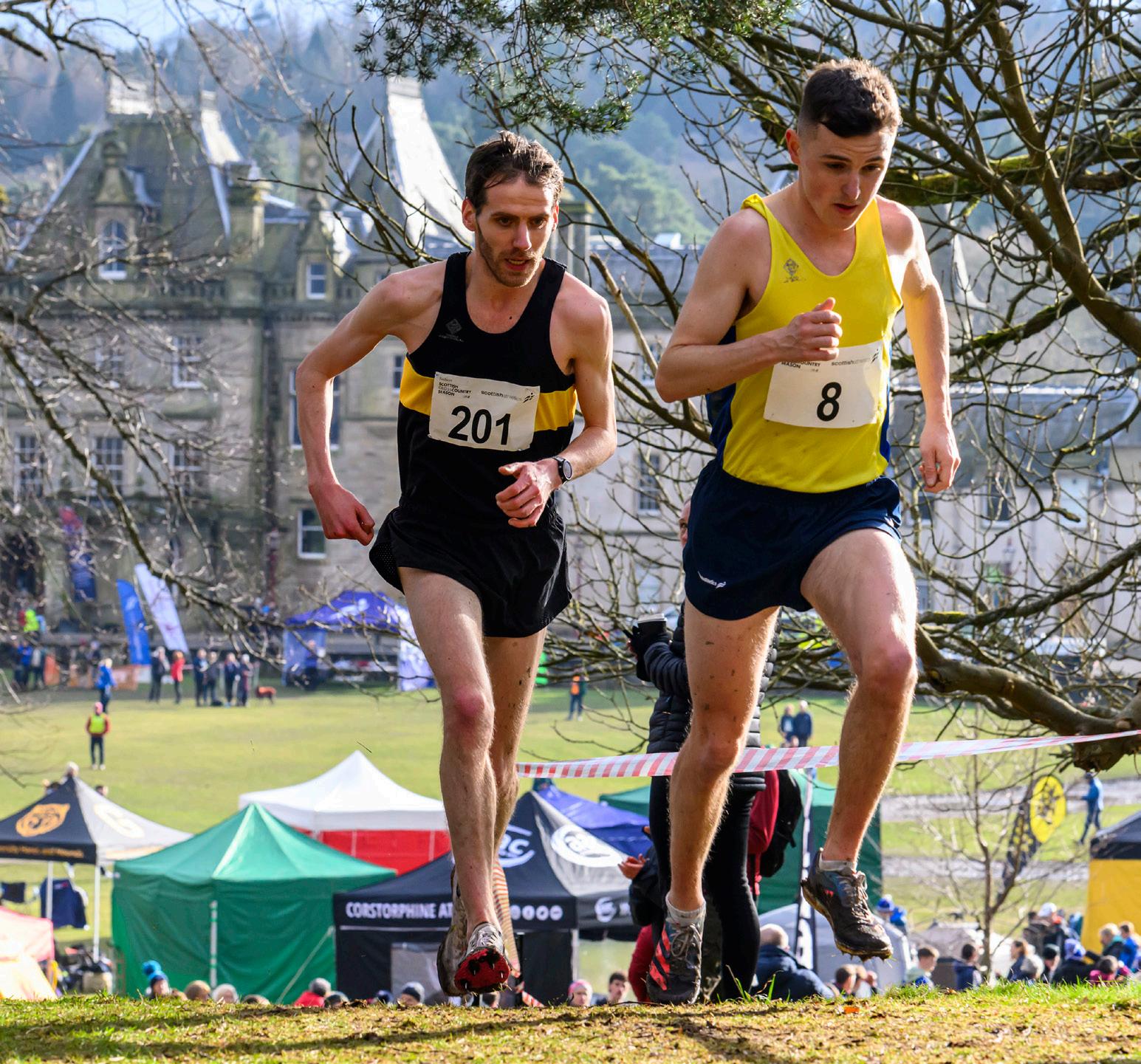
Hat-trick hero races into the history books
Jamie first to win three-in-a-row this century
 By Peter Jardine
By Peter Jardine
Jamie Crowe was raised on tales of medals, mud and misadventure at the National XC at the knees of his dad, Des, long before he pulled on spikes in earnest.
Now the talented Central AC runner is very much part of the race’s celebrated history.
A third successive title win in the Senior Men’s race moved him into an elite group of athletes who have won three or more golds in around 135 years of competition.
In fact, he is the first to win three this century since Bobby Quinn for Kibarchan AAC at the close of the 1990s.
Adding further historical context to this year’s race, Scott Stirling’s silver gave host club Falkirk Victoria Harriers their very first individual medal at Senior Men’s level.

Inverclyde AC’s Ben Potrykus proved best of the rest to land the bronze medal over the 10k course in what might be described as benign conditions compared to some recent years.
‘It means a lot to win for the third time at Senior level,’ said Jamie.
‘I grew up hearing stories about the National XC from my dad and the importance of it as an event. Other family members spoke about it, too.
‘So to become part of that history is a great feeling. Andy Butchart reminded me before the race that he only has two, so that was another motivation for me.’
At 28, it seems entirely likely that Jamie will have opportunities to seek out title win No 4 – and he has insisted running the event annually is very much a career plan.
‘I definitely envisage trying to add to that tally of three wins if I can,’ said the Dundeebased PE teacher.
‘As long as I am fit, I will be here. It is a really good day and a great end to the cross country season in Scotland – you see that with the numbers and the atmosphere around the course. ‘
Crowe’s win led Central AC to their 13-ina-row in terms of team golds as he was backed up by Cameron Milne, Calum Phillip, Alastair Marshall, Luca Fanottoli and Joel Lange.
Potrykus headed Inverclyde’s team effort as they finished in silver (only 16 points behind Central). Carnethy HRC took the bronze medals with Eddie Narbert in eighth place.
Stirling kept pace with Crowe for much of the race, the pair who have contested key National titles at three venues this winter having broken away from the rest early on.

Once again, there was a superb atmosphere around Callendar Park with probably between 3000-4000 people in attendance over the day. More than 1700 athletes finished their National XC test of endurance, over 950 of those in the Senior Races.
Stornoway RAC always make a real effort to attend in good numbers and bringing along their bagpipes was a welcome addition.
PB 2024 | ISSUE 1 8 Falkirk

Down the field in that Men’s race there were stories of father and sons from the same club and the likes of Barry Davie, a V40 athlete with Carnegie Harriers, who completed his 22nd National in a row.
The depth and quality is a feature and one look at the U20 gold medallists only underlined that observation.
Andrew McGill and Natasha Phillips are both GB and NI internationals with the Livingston athlete having raced the Euro Cross in December while Natasha competed at the Euro U20s on the track last summer.
At Falkirk, the combination of speed and strength propelled them to U20 gold, with the Women’s race more clearcut.
The Dundee Hawkhill Harriers athlete established a winning lead long before the final straight to come home first ahead of Isla Paterson of Gala Harriers and Isla Hedley of Edinburgh Uni Hare and Hounds.
McGill, racing for Livingston Ac, had to fight harder for his gold but did enough in an exciting finish to see off Finlay RossDavie of Edinburgh Uni Hare and Hounds (and Garscube) by three seconds. Fraser Gilmour of Kilbarchan AAC took the bronze. Edinburgh Uni Hare and Hound won both the team titles.
Women’s race report See Page 10

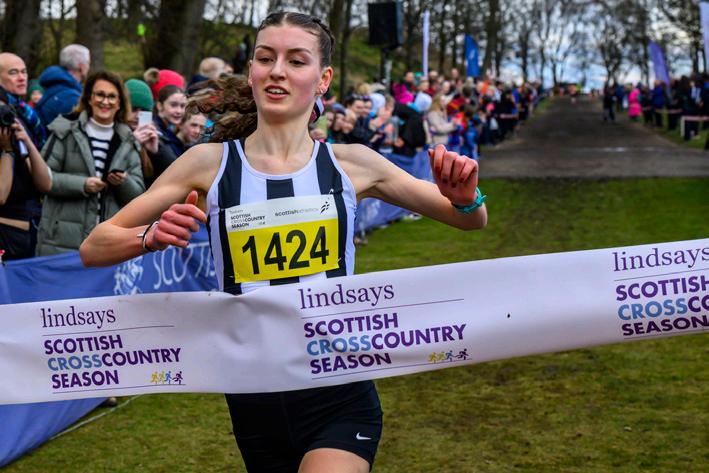
Millie McClelland-Brooks didn’t just blow away the opposition to win the U17 Women’s race at Falkirk - she beat family illness, too.
A bug at home posed a significant threat in the week before the race to the Inverclyde AC’s athlete’s hopes of gold. But with the cooperation of her family and some Covid-style measures Millie thankfully avoided the bug as she won across the mud.
Craig Shennan was the U17 champion and in so doing the Giffnock North AC athlete maintained his own superb personal record at Falkirk.
Craig took the U15 title two years ago and bronze last year at U17 and he gave Giffnock an individual champion on the day they won four team titles in the U17, U15, U13 age groups.
Six different clubs were represented on top of the podium with the U15 champions from Strathearn Harriers and Falkirk Vics and the U13 champions from Team East Lothian and Anster Haddies.
U13 Girls
1. Imogen Turner (Team East Lothian)
2. Emma Nicholson (Kilbarchan AAC)
3. Isla Madhra (Lasswade AC)
U13 Girls Teams
1. Giffnock North AC
2. Dundee Hawkhill Harriers
3. Falkirk Victoria Harriers
U13 Boys
1. Luca Anderson (Anster Haddies)
2. Harry Robinson (Dundee Hawkhill Harriers)
3. Conor McNab (Edinburgh AC)
U13 Boys Teams
1. Giffnock North AC
2. Aberdeen AAC
3. Edinburgh AC
U15 Girls
1. Eilidh Dallas (Strathearn Harriers)
2. Freya Brown (Lasswade AAC)
3. Holly Simpson (Giffnock North AC)
U15 Girls Teams
1. Lasswade AAC
2. Giffnock North AC
3. Harmeny AC
U15 Boys
1. Ray Taylor (Falkirk Victoria Harriers)
2. Calum Dick (Giffnock North AC)
3. Daibhidh Kinnaird (Cambuslang Harriers)
U15 Boys Teams
1. Falkirk Victoria Harriers
2. Giffnock North AAC
3. Cambuslang Harriers
U17 Women
1. Millie McClelland-Brooks (Inverclyde AC)
2. Ruth Walsh (Giffnock North AAC)
3. Zara Redmond (Kilbarchan AAC)
U17 Women Teams
1. Giffnock North AC
2. Fife AC
3. Falkirk Victoria Harriers
U17 Men
1. Craig Shennan (Giffnock North AC)
2. Kieran Fulton (Moorfoot Runners)
3. Ronnie Brown (Team East Lothian)
U17 Men teams
1. Giffnock North AC
2. Harmeny AC
3. Garscube Harriers
Photos by Bobby Gavin
9 scottishathletics
Falkirk
Photos by Bobby Gavin
Lindsays National XC


Winning the Lindsays National XC title should not be easy. Even for club runners towards the back of the race, there should be a serious test of endurance.
Callendar Park’s hilly course tends to offer that even in conditions which might be described as rare for Scotland in February. Training for the National usually falls into the toughest months of the year in terms of weather and available light – December, January and February.
So it was no surprise to hear 2024 Women’s champion, Alice Goodall, suggest there were no short-cuts to the podium.
The Edinburgh AC athlete turned silver from the previous year to gold this time as she built up a winning advantage over her
Edinburgh AC club-mate, Nancy Scott, and last year’s title winner, Scout Adkin.
‘I think it always comes down to consistency of training, ‘ said Alice, when asked about her strong performance.
‘You have to turn up for training and get the work done. I think a lot of people are talking about B plus sessions now rather than everything having to be A plus. Not every session has to be good or even can be good.
‘I didn’t have the best of starts to the cross country season but it has been very consistent since Christmas and that has paid off.
‘I am absolutely delighted. Falkirk is the home of cross country in Scotland for me and the Lindsays National XC is the big one, the most important event.
sunnier climate for the World Unis XC is Muscat, Oman,’ she said.
‘It was very different kind of running from Callendar Park that is for sure. It was almost like a road race and I ran it in my carbon shoes. No mud in sight and about 30 degree heat to deal with, too.
‘I was thinking about last year as I went round with Scout having won last year. And I know she likes the hills here. We went into the second lap and I kind of gave her a taste of her own medicine!’
Alice led home Edinburgh AC with team-mate Nancy Scott making it a club 1-2 with Grand Prix leader, Kirsty Walker, in fourth. Adkin, racing for Moorfoot Runners, was the bronze medallist.
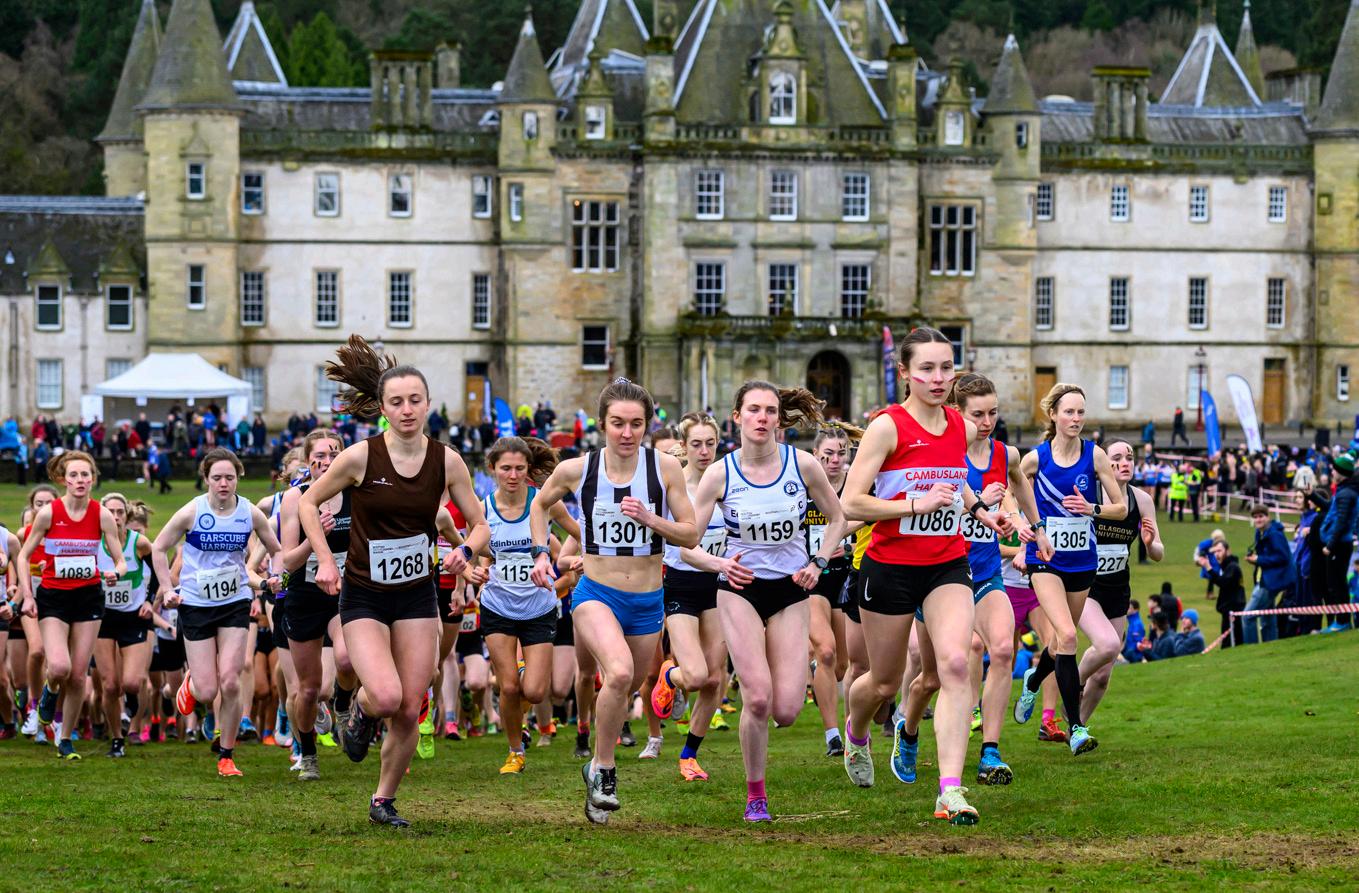
‘I wasn’t here all that often as a youngster. I had injuries but to be honest I was not the biggest fan of cross country at U17 and U15 – I was more of a track runner.’
Goodall revelled in Falkirk despite having raced to silver a week earlier in Oman for a British Unis team at the World Unis.
’A week ago I was in a much

With Zoe Pflug and Eve MacKinnon at fifth and sixth, Cambuslang Harriers had high hopes of making the podium and so it proved with silver medals there the first of any colour in that race for a club who turned 75 this year.
Shettleston Harriers were no sooner off the podium for their bronze medals than they were hot-foot to Glasgow Airport for a flight to Portugal! Shettleston women raced at the Euro Club Cross Champs only 24 hours after the National XC.
PB 2024 | ISSUE 1 10



Benefit your club as we invest in the athletics club network
15%
Edinburgh 0131 229 1212
For more information view the offer on lindsays website by scanning the QR code on your smart device
edinburgh@lindsays.co.uk
Glasgow 0141 221 6551


Lindsays is a Scottish firm of experienced lawyers for people and businesses. We are owned and run in Scotland, covering the country from our offices in Edinburgh, Glasgow and Dundee.
scottishathletics club offer
If you use our services, we will give 15% of our final fee for any work undertaken by us back to your club. Our offer applies to the following services:
• Residential property sales and purchases
• Family law and divorce
• Wills and Powers of Attorney
• Executries
• Employment law services
Please quote Athletics15 when you get in touch
glasgow@lindsays.co.uk
Dundee 01382 224112 dundee@lindsays.co.uk
lindsays.co.uk

develop. I’ve raced there so many times as a kid and in my teens and have a lot of memories.
‘To put it simply: it’s a fundamental venue for track and field in Scotland. The Scottish Schools is there, the Age Group Champs are there and there competitions and championship events are the starting point for many careers.
‘I do not know what can be done financially. Could it be a multi sport venue, somehow? I do not know. But there has to be an avenue other than closure.’
Research by consultants acting for scottishathletics confirms Grangemouth’s central Scotland location adds to the strategic importance. No fewer than 2.9 million people live within an hour’s drive of the facility. That’s a lot of clubs ‘connected’.
‘It would be a lost opportunity for youngsters within that area and further afield,’ added Eilish.
Eilish McColgan
‘They would be off their heads to close Grangemouth – it is where athletes are forged’
 By Peter Jardine
By Peter Jardine
There’s
nothing refined about the ageing track and field facility at Grangemouth stadium.
But it can be a venue where athletes are defined.
And, as the spiritual home of track and field athletics in Scotland, it has effectively elbowed Meadowbank aside as the national stadium – certainly this century.
No wonder no lesser a figure than Commonwealth champion and multiple British Record holder Eilish McColgan argues vehemently that Grangemouth must be saved as a crucial staging post where careers are forged.
Memories of early year competition still burn as brightly for Eilish as the nearby Grangemouth refinery plume which, with a little imagination, becomes an Olympic flame for wannabes at every age and stage . . .
‘It is really important that the facility is saved,’ insisted Eilish.
‘We don’t have too many track and field venues in Scotland so every single one is important and particularly Grangemouth.
‘It is just where young athletes get to compete in the sport we love and get to
‘And as I said, across the whole of Scotland, to lose another facility, another track, would be very damaging. I mean, it almost happened with Meadowbank, but thankfully they’ve managed to revamp that and we have a new facility there.
‘So it’s really just, I know, securing it for the next generation of youngsters coming through. They have somewhere that they can feel safe to try athletics, to compete, to race.
‘It is about all of those key memories that you have as a youngster are competing across stadiums, across this country.

PB 2024 | ISSUE 1 12 PB Interview Eilish McColgan
Photos by Bobby Gavin

‘So yes I think for that local area around Grangemouth and local clubs it is a really important place to try and retain and retain as many of them as we possibly can. But we also know people travel there to compete in champs and we’d lose that, too.’
Eilish is a persistent flag-bearer for the benefits of athletics both in a club member sense and also in the more relaxed sense of keep fit or jogging (via a local jogscotland group or whatever).
‘I mean we know the benefits of keeping fit and active, we know the benefits not only just for general fitness in later life but even mental health, we even know now the benefits have gone out and getting fresh air running outside, getting away from TV, computer games,’ she added.
‘So you need the framework to deliver that via sports facilities. We all have to do our best to keep these stadiums as much as we can.’
Her own memories are wrapped together in league matches, School Champs, the Scottish Age Groups and then the Scottish Unis.
‘I actually have a picture from the archives of Laura Muir and me actually competing at the Scottish universities,’ recalled Eilish.
‘I’m competing for Dundee Uni. So a little bit older than Schools or Age Groups, but that’s how important these stadiums are, I mean from the age of probably about 13 years old, right the way through to even university championships, we were competing there.
‘Laura looks very different to what she does now. I probably don’t look that different, I think I’m still very tall and stand out, big blonde hair on me, bleached blonde hair back then, I’d say white, bordering on white hair.
‘I mean, at the time, we had no idea who each other were. Laura was certainly not the athlete she is today and I was definitely not the athlete I am today either.
‘So it’s fun to look back at that and go, WOW, I competed against Laura Muir early on. So there’s memories that you look back and that’s what happens at Grangemouth.’

Lynsey led way for us to follow
Eilish McColgan is setting her sights on competing at a fourth Olympics in Paris this summer.
Twelve years on from her London 2022 debut in the steeplechase, the 2022 Commonwealth Games champion believes the 10,000m will again be her best route to selection and success.
And, should she achieve a fourth Olympics in GB and NI colours, Eilish will likely offer a quiet thank you to ‘path-finder’ Lynsey Sharp.
‘I’m trying to make my fourth Olympic Games with the British team,’ said Eilish.
‘I made my debut in London back in 2012 and then competed in Rio four years later and also in the Covid-delayed Tokyo Games (in the summer of 2021).
‘I’d love to make my fourth because when I was a youngster I didn’t grow up dreaming of being at an Olympics. I just never imagined being good enough if I am honest.’
European and Commonwealth medallist Sharp, of course, called time on her career shortly before Christmas with mumof-one Lynsey feeling the time was right to hang up the spike.
‘Lynsey and I go back a long way and she’s had a great career,’ said Eilish.
‘In many ways, she was a ‘path-finder’ for top Scottish athletes.
‘We first raced together at a Scottish Primary Schools cross country meeting.

It’s long time ago, yes. The journalists there put a focus on myself and Lynsey and they took this picture and it’s horrendous.
‘Lynsey has this tiny little like bob haircut and I just look petrified. It was the first time I came across Lynsey and she just battered everybody in that race.
‘I don’t even know where I finished but she was off - she won it by a long way and I just remember thinking ’WOW’.
‘Lynsey was just someone that always seemed to be at the top of her game and I suppose that was hugely inspiring for me.
‘A few years later when Lynsey broke into the GB and NI team I still thought I was more likely to be making a Scotland team of Commonwealths. She was going to Europeans and we were similar age and stage. And I just thought ‘If she can do that . .
‘It gave me inspiration and motivation and it helped me make the British team for London 2012.’
13 scottishathletics PB Interview Eilish McColgan
World Indoors 24 Emirates Arena

Worth the wait
Inside the new Emirates Arena after redevelopment work
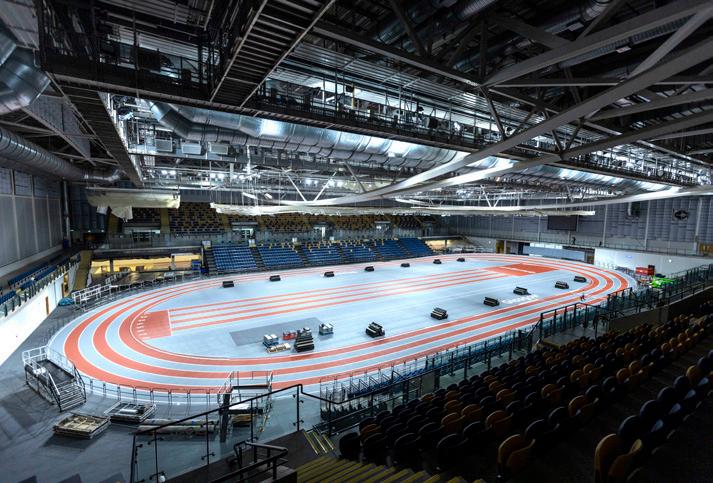

 Photos by Jeff Holmes
Photos by Jeff Holmes

Colin Hutchison believes the new track and field facility at the Emirates Arena will inspire athletes for years to come.
And our Chief Executive expects the anticipation will be at fever pitch come the end of this year when we really start to look ahead to the 2025 4J indoor season.
Glasgow Life made a big commitment to the venue for the World Indoors with a sevenfigure investment ensuring the whole arena was redeveloped some 12 years after the original build.
Patience was very much required by our track and field community but the waiting was over just a couple of weeks prior to the first global track champs in Scotland.
‘I am delighted the renovation work at the Emirates Arena has been completed and the World Indoors had the perfect platform,’ said Colin.
‘The benefit for the athletics community in Scotland – as well as seeing global stars up
close for a few days – is a ‘new’ indoor track and field facility for years to come.
‘It has been there a while now and, realistically, the arena needed improvements at some point. We are pleased to be through the other end of that now. Athletes and coaches have been very patient this winter, and we are grateful for that.
‘We managed to stage some championship events and went to four parts of the country with qualifying and finals. But, of course, with certain sprints and distance events not able to happen it was far from ideal.
‘So at this stage we are really excited about coming back in the winter of 2024-25 for our indoor season and the return of a full programme of Scottish Championship events. I am sure other organisations like Scottish Schools and Scottish Student Sport cannot wait, either.
‘‘The venue looks great now and the atmosphere for the World Indoors was very special.’
As part of the ongoing refurbishment programme of its sports facilities, Glasgow Life scheduled the works to be completed
ahead of the first global track champs to be held in Scotland. The Kelvin Hall previously hosted the European Indoors.
Glasgow Life has overseen the build, working with specialist suppliers DYNAMIK and Mondo, as the Arena was upgraded 12 years after its original construction for the Glasgow 2014 Commonwealth Games.
As part of the city’s commitment to achieving carbon neutrality by 2030, a new LED lighting system has also been installed at the venue, reducing energy consumption.
It will provide better operational conditions for broadcast and support wider legacy uses of the space.
World Athletics Chief Executive, Jon Ridgeon, said: ‘This is a fantastic legacy for the City of Glasgow and ensures a world-class training and competition facility for Scottish athletes who are increasingly becoming a fixture on our podiums.
‘I think the redevelopment enhances championships and also secures the future of the sport at all levels for many years to come.’
PB 2024 | ISSUE 1 14
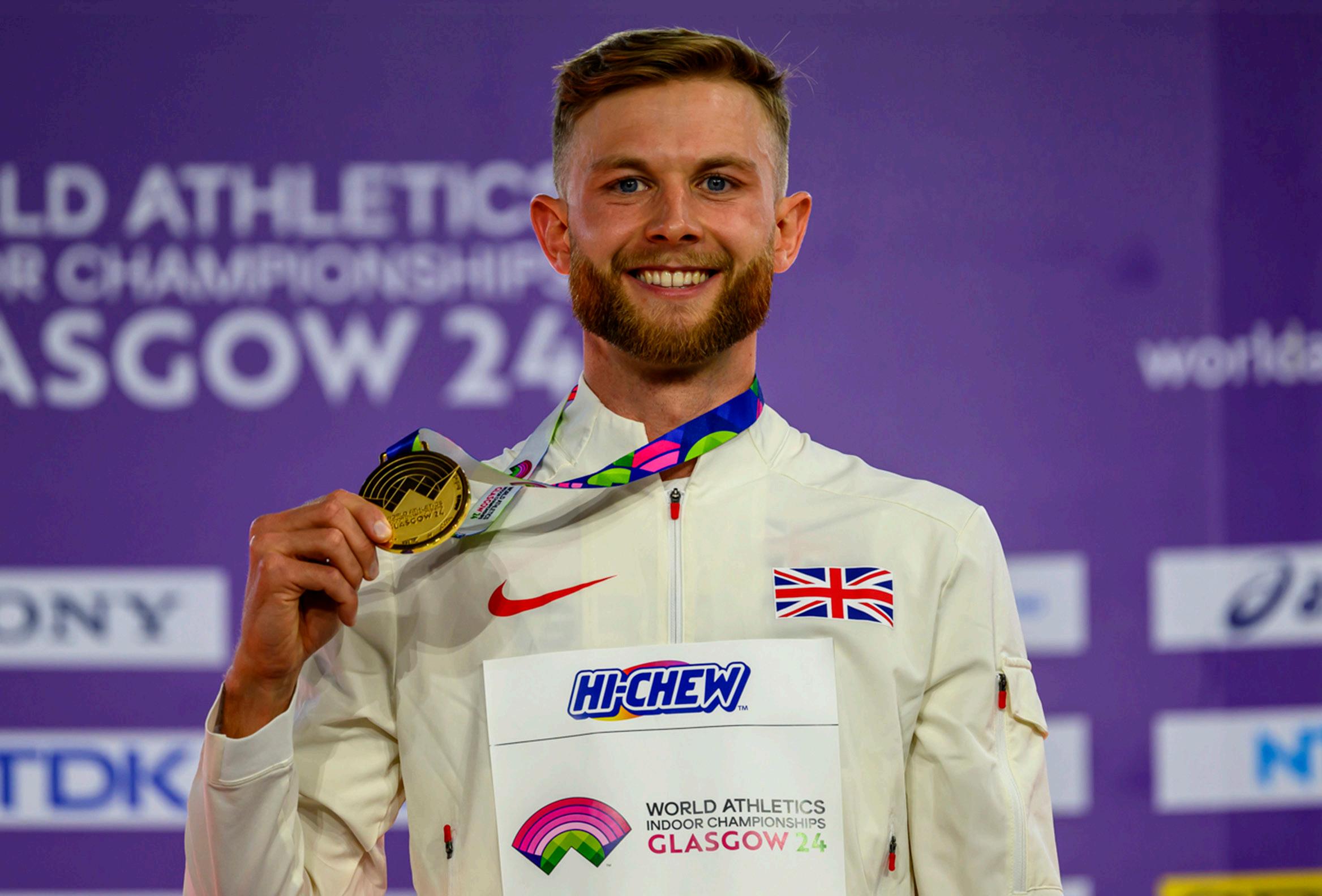

12
Pages of Reports and Photos
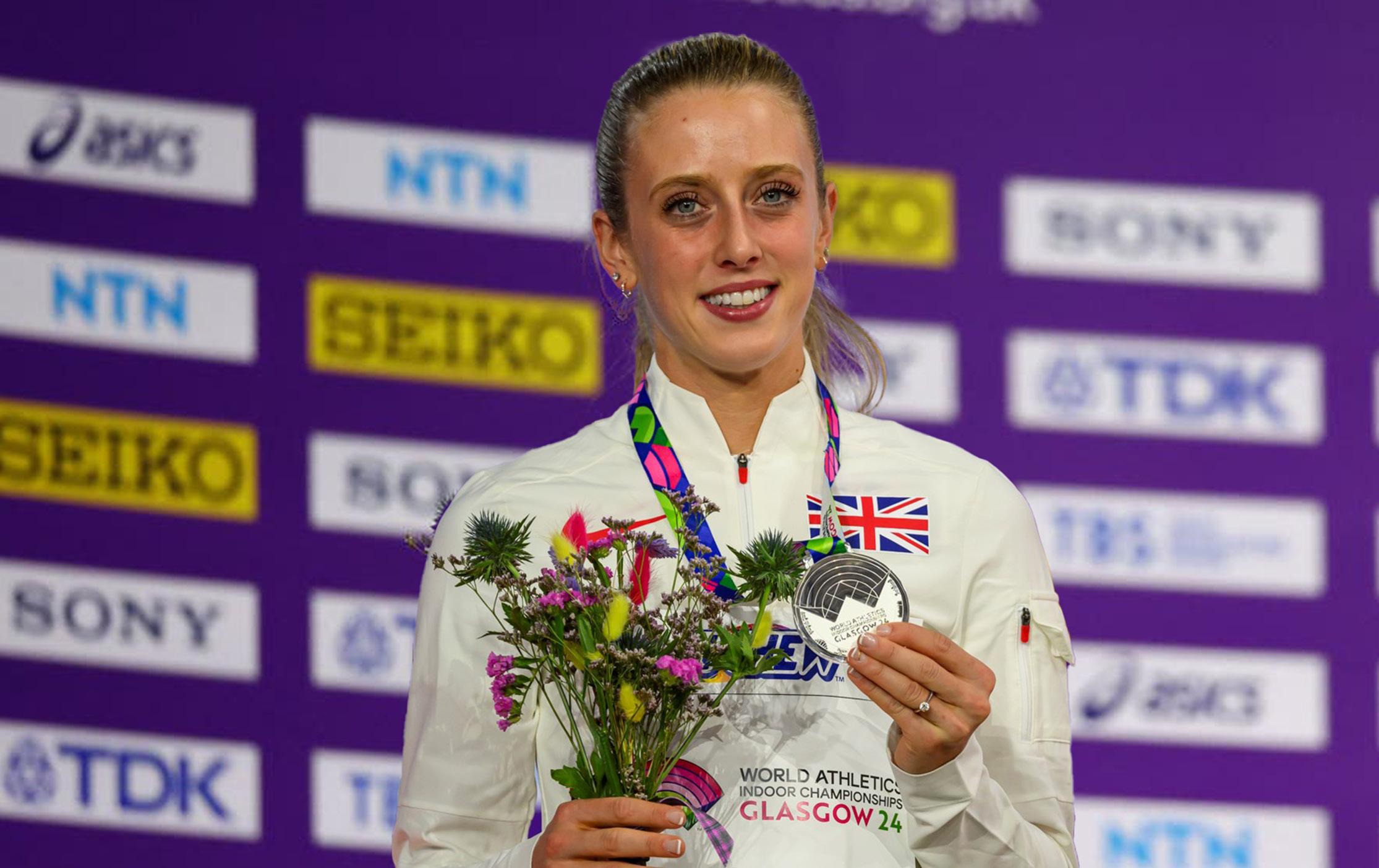

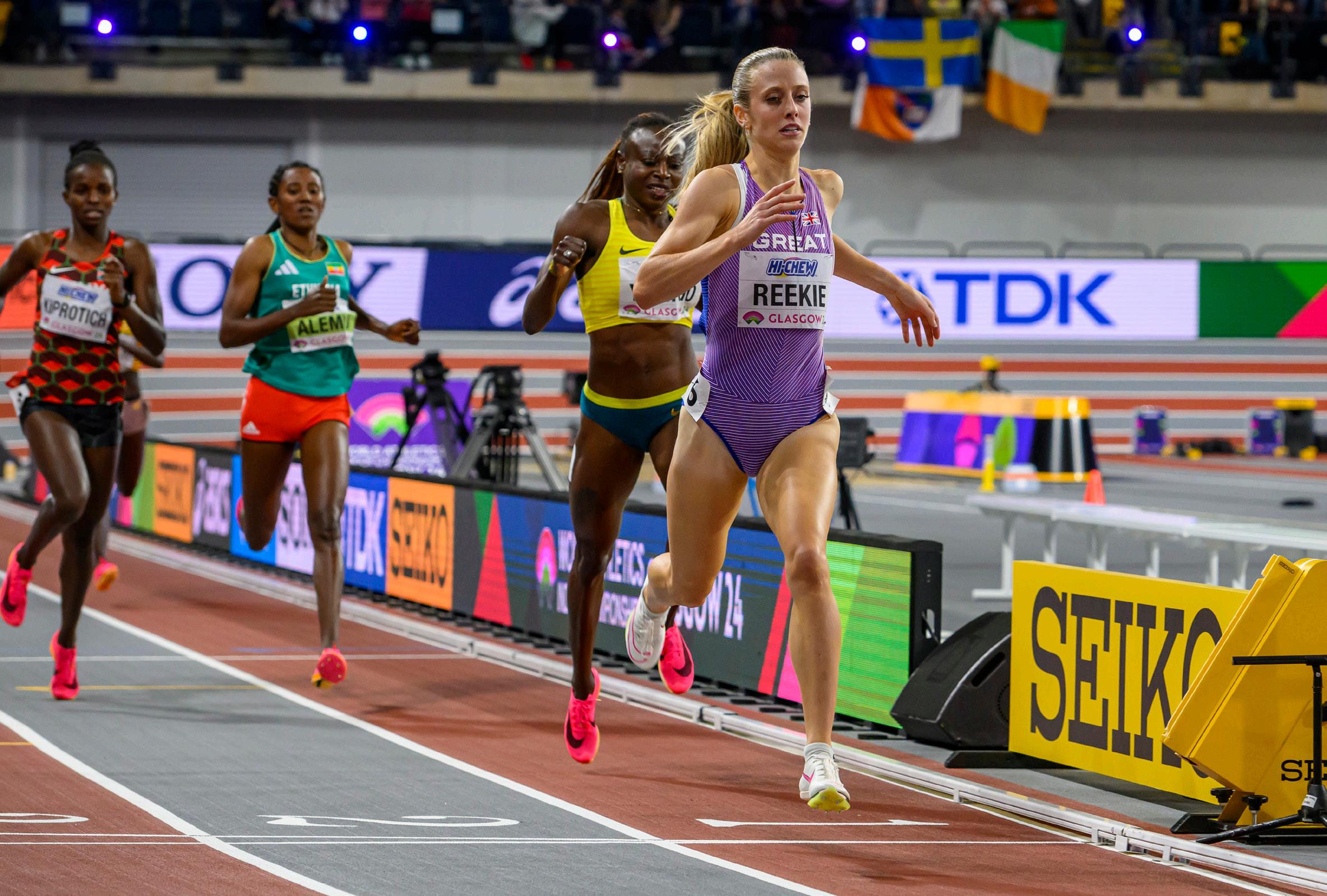
Silver service as Jemma belongs to Glasgow
Reekie gets back on the bike after tough times
 By Peter Jardine
By Peter Jardine
Blond ambition realised. Jemma Reekie’s journey to her World Indoors silver lining has had more turns than four laps of the Emirates Arena track.
It started not far short of 20 years ago when she first pulled on a pair of running shoes at Beith Primary School in North Ayrshire.
Kilbarchan AAC soon became her cradle and progression through the age groups on the athletics pathway in Scotland brought success and early age Scotland vests,
including memorably at the (former) Celtic Games international at Grangemouth.
European U20 success was followed by a stunning gold medal double at the European U23 Champs in the summer of 2019 and the step-up to Senior representation with GB and NI – alongside star training partner Laura Muir – followed almost seamlessly.
The rollercoaster thereafter included some agonising fourth and fifth place finishes (including the Tokyo Olympics), the Covid competition disruption, suffering from glandular fever and changing coach just over a year ago.
One facet of Jemma’s career has remained constant, however. Her drive to succeed and be the best she can be.

‘Jemma always had a beautiful running style and stride but it was her attitude and her temperament – her determination to get betterwhich stood out,’ primary school teacher Liz Duncan told us on these pages a few years ago.
‘She wanted to win every race
and if she could not win it then she wanted to improve her time, even if only by a second or two.’
Mrs Duncan was referring to early cross country outings at that stage and there are marvellous pictures of Jemma at this stage representing her school.
In the same PB article from 2020, writer Katy Barden also spoke to Jemma’s mum, Morna.
‘It was always in her nature that if she wanted to do something then she gave it her full focus,’ she said.
‘She was determined. Like learning to ride a bike – she had to do it that day.
‘She would have fallen off that
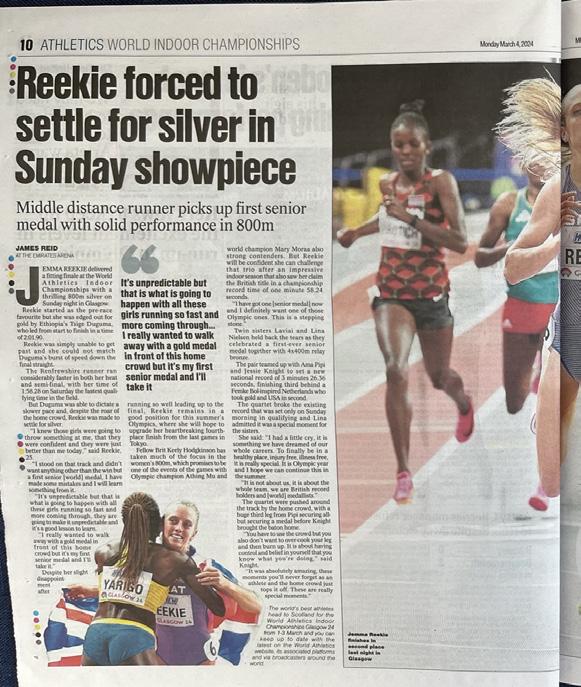
PB 2024 | ISSUE 1 16
Jemma Reekie

bike all day and taken the blows, but she had to learn to do it that day. If there was something she wanted to do, she would do it.’
In athletics terms, Jemma has got ‘back on the bike’ after a difficult time in 2022-23 and moving to work with coach Jon Bigg and his wife, Sally Gunnell, has paid off.
There’s no doubt she wanted gold in that final, after winning both her heat and her semi-final in fine style.
Young Ethiopian Tsige Duguma had other ideas and, having moved up from 400m, worked the race to her advantage after a pretty sedate opening lap of 63 seconds. Jemma challenged briefly at the start of the last lap but Duguma quickly pulled away.
‘Listen, it is a silver medal in a global champs and I have to take that,’ smiled the Scot, who clocked 2:02.72 with the Ethiopian at 2:01.90. Behind them, there was a global medal moment at 38 years of age for Noelle Yarigo of Benin.
‘I’ve had fourth place (in the Olympics in Japan) and if I’d had fourth again today then there would have been a lot of tears flowing, I am sure of that.
‘We’ve worked really hard over the last year to get into this position and I know there is a lot more hard work ahead.
‘I have got a global medal now and I definitely want one of those Olympic ones. This will be a good stepping stone going forwards’
‘I am doing different training from before and I’m enjoying my training and racing again. It had become a chore for a wee while to be honest.’
Previous training ‘chores’ included lapping the original Emirates track umpteen times in sessions. Coming back for a World Indoors was no hardship, however.
‘I loved being back in Glasgow and racing at the Emirates Arena once again,’ said Jemma.
‘I soaked up the atmosphere each day and was thrilled to be competing here again. To be standing with a silver medal is something I would not have thought could happen a year ago.
‘I have got a global medal now and I definitely want one of those Olympic ones. This will be a good stepping stone going forwards.
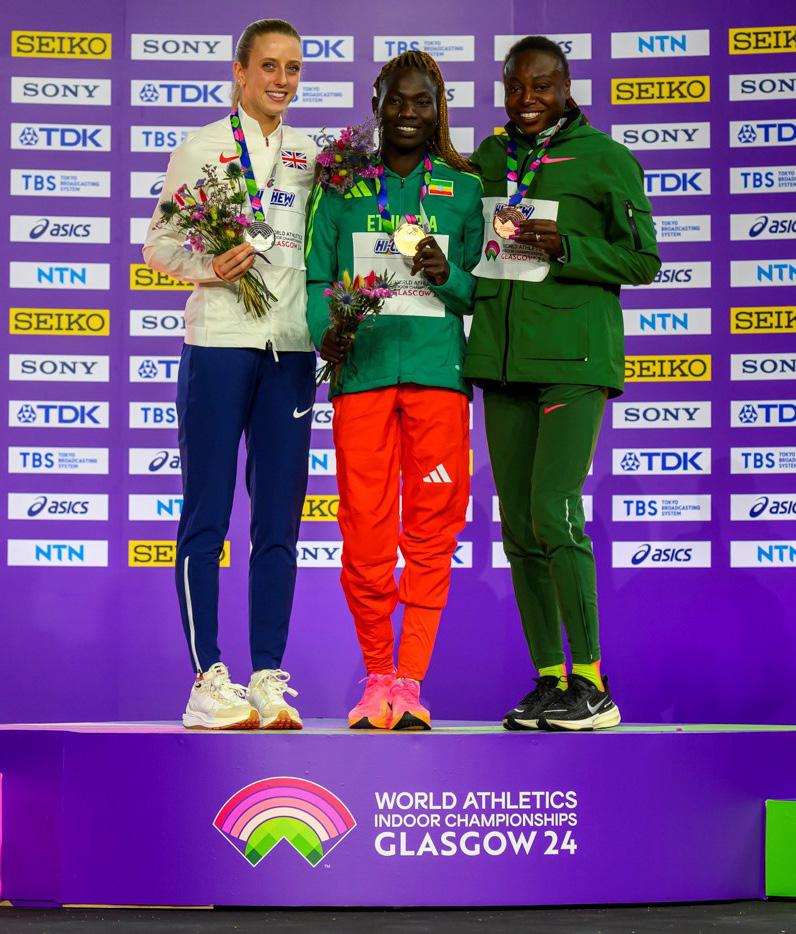
‘I do hope I can inspire young Scottish athletes. I know some of the young Kilbarchan girls coming through and I just want to show them what is possible. ‘They just have to keep going; no matter what happens you have to keep trying to improve and to PB.
‘You do go through tough times – this time last year I was lost and going to training was a chore.
‘I am enjoying it again and I’m here a different athlete and now a medallist at a global champs.’
Different, definitely. But with still the same streak of determination.


17 scottishathletics
Reekie
Jemma


‘If I have inspired one young athlete by racing in Glasgow, then that’s me thinking ‘job done’
 By Peter Jardine
By Peter Jardine
Role model is a difficult label or concept to define. Who confers it? What does it entail? Can you be a role model even if you don’t want to be?
Laura Muir embraces the, er, role better than just about anyone in Scottish sport.
The evidence is there over a decade at the top in athletics – which in itself is hugely inspirational given sport never stands still
and particularly not an individual sport like track and field.
It’s there in her performances, her media profile but also in her actions.
This is Laura who contacted Scottish Athletics in October and indicated she wanted to attend an event in the Lindsays Cross Country Season.
And then contacted us again to say she had six large bags of excess kit she wanted to distribute to young athletes at clubs.
As it happened, East Kilbride AC, Shettleston and Garscube were the beneficiaries and some of that kit may even have been worn at the Emirates Arena for the World Indoors.

Laura’s visibility in Scotland, including racing the Lindsays Short Course XC a number of times and BMC/Glasgow Athletics Association meets on the track, has been a feature of her superb career.
Even as she exited the track after a fifth place finish in the Women’s 3000m final, Laura was stopping for autographs and smiling for selfies with youngsters.
‘I’m glad I was able to go out there and be seen by the Scottish kids at the World Indoors,’ said Laura, with the Olympics in Paris of course a big focus for 2024.
‘I mean that was part of the reason I was here. If I just inspired one kid here today that’s me thinking ‘job done’.
‘I think it’s so important to be relatable and to be seen and to be racing this track that hopefully kids can train on or race on over the next couple of years.
‘It’s visibility, really. I don’t think you can beat that for young athletes and it is what I wanted to do - I just want to be seen and be in front of a home crowd once again.
‘You want young athletes in Scotland to be thinking: ‘Laura can do it, why can’t I do it?’ and I just want to be seen to be someone that they can relate to and hopefully Inspire them.
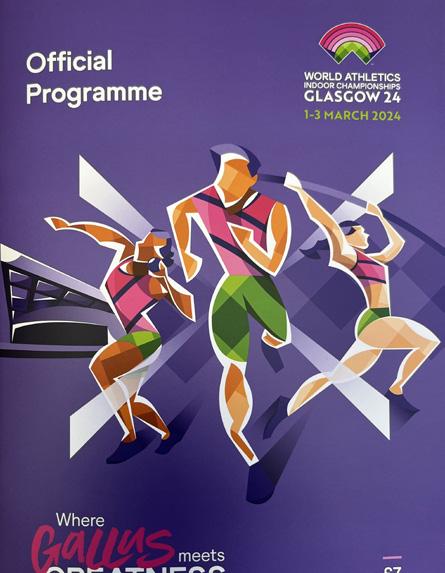
PB 2024 | ISSUE 1 18 Laura Muir


‘I really wanted to do that and it is one of the reasons I changed the schedule knowing it was in Glasgow. Young Scots will come here next season for the Scottish Indoor champs and they will be out there in the same venue as us.’
There probably won’t be 16 of them in an indoor 3000m.
That was the ‘stacked field’ Laura faced as she chased her 15th international medal. Ultimately, the quality and depth of the race proved a little too much and a run of 8:29.76 – her second fastest 3000m ever –landed fifth place.
America Elle St Pierre overhauled favourite Gudaf Tsegay to win in 8:20.87. Laura’s time is a new Scottish Native Record.
Why Laura Muir is a visionary on visibility
‘I just had to run the best race that I could and I had to run my own race,’ said the 30-year-old.
‘Unfortunately it wasn’t fast enough for a medal but I don’t think I could have done much more. I ran as fast as I could for for as long as I could and it was just such a competitive race.
‘This time last year the World Indoors wasn’t in our plans so I’m just so pleased that I was here and I could run. I’m fit, I’m healthy, I’m competitive and feel in a really good spot ahead of the summer.’
As Laura was still coming through the television interviews on the Emirates gantry, Josh Kerr lined up for the Men’s 3000m final. Peering over barriers, Laura savoured
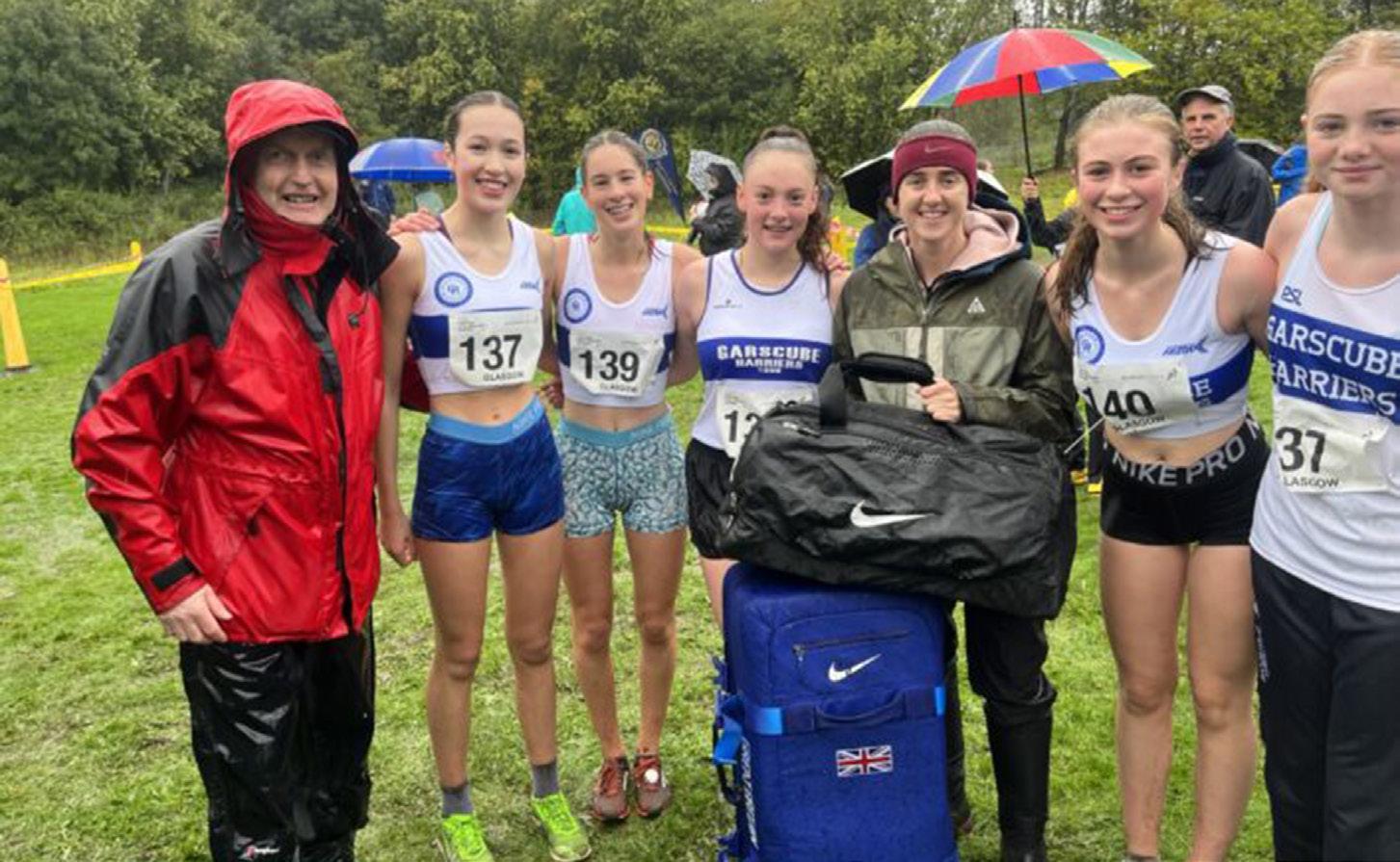
the moment like every other Scot inside the Glasgow arena.
‘I’m really glad my race was before Josh and then I could watch him a little there,’ she said.
‘I was stopping in between interviews and peering over barriers. It was special to witness that.
‘I mean to be world champion anyway (over 1500m outdoors in Budapest last summer) but to come back and be world indoor champion on a home track – well, that is brilliant ahead of the Olympics.
‘I’m so happy for Josh. He deserved it so much. He is running incredibly well so that was so exciting to see and I’m so glad he was able to make it fit for his plans as well.’
Next stop, Paris.
‘Hopefully we’ve a few Scots now which is fantastic. As I say, each of us has different back stories and pathways to success so hopefully folk can relate to, or children can relate to.
‘I think our sport is in an exciting place it’s just so lovely to have Scottish athletes on podiums.’
You have to see it, to be it, in fact.
19 scottishathletics
Muir
Photos by Bobby Gavin
Laura

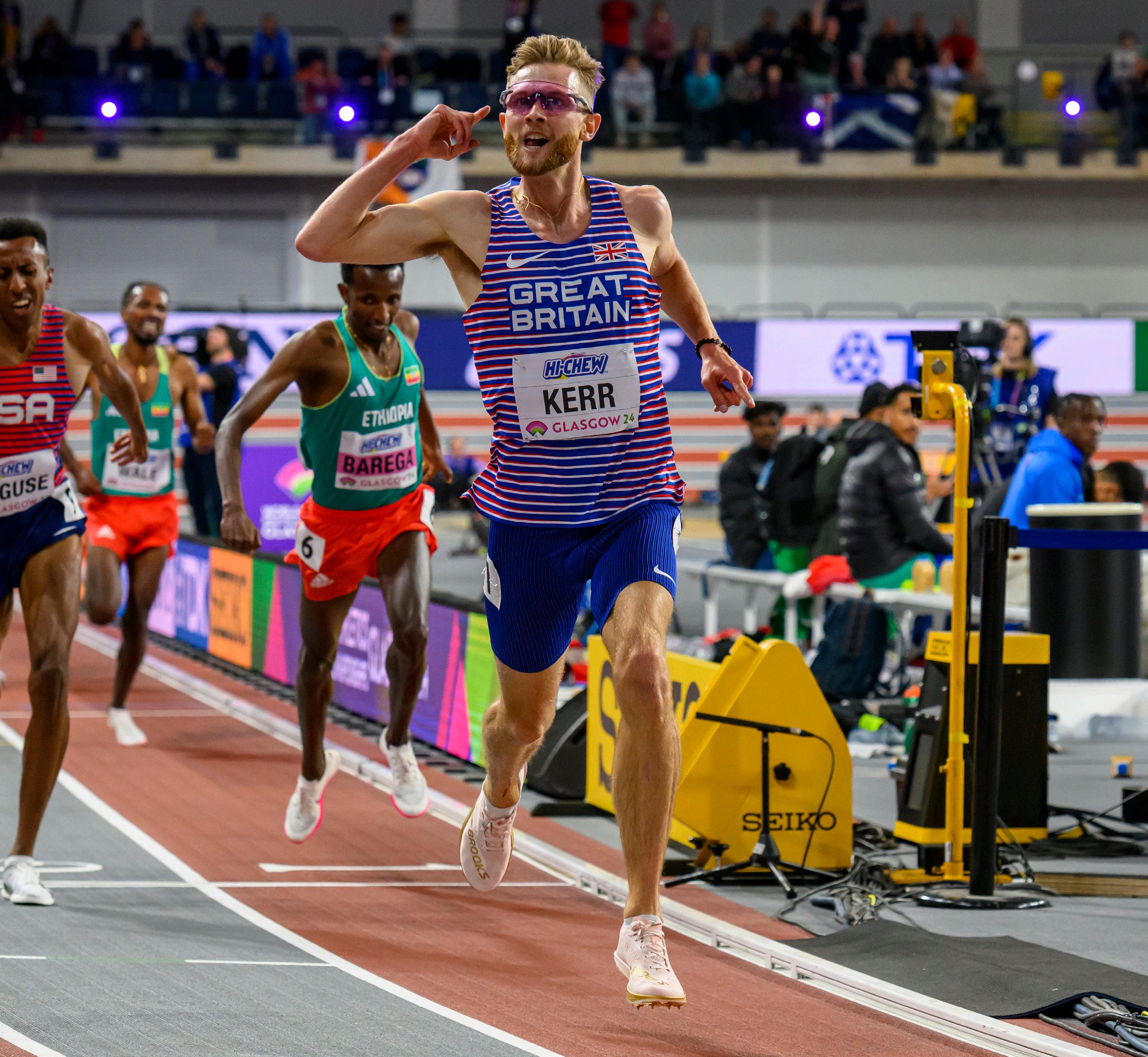
Untouchable and unstoppable . . . but nothing unpredictable about latest Josh gold
Favourite status sits comfortably with our local hero
 By Peter Jardine
By Peter Jardine
Steve
Cram
entertained guests at the Lindsays Sports Forum. David Rudisha rocked up at Glasgow Green to present club road race relay medals. And shot putt world champion and world record holder Ryan Crouser posed for pictures at the Kilbarchan AAC indoor centre at Linwood.
There were unexpected happenings in Glasgow for almost a full week around the World Indoors.
But, as just short of eight minutes of action unfolded on the new Emirates Arena track in an eagerly-awaited men’s 3000m final, it became clear Josh Kerr would fulfil his status as the ‘banker bet’. Or the racing certainty, if you prefer.
Josh as it happens co-hosts a podcast entitled ‘Sit and Kick’. Which rather gives away his preferred option and tactics good enough to see off Jakob Ingebrigtsen for the world title at 1500m in Budapest last summer.
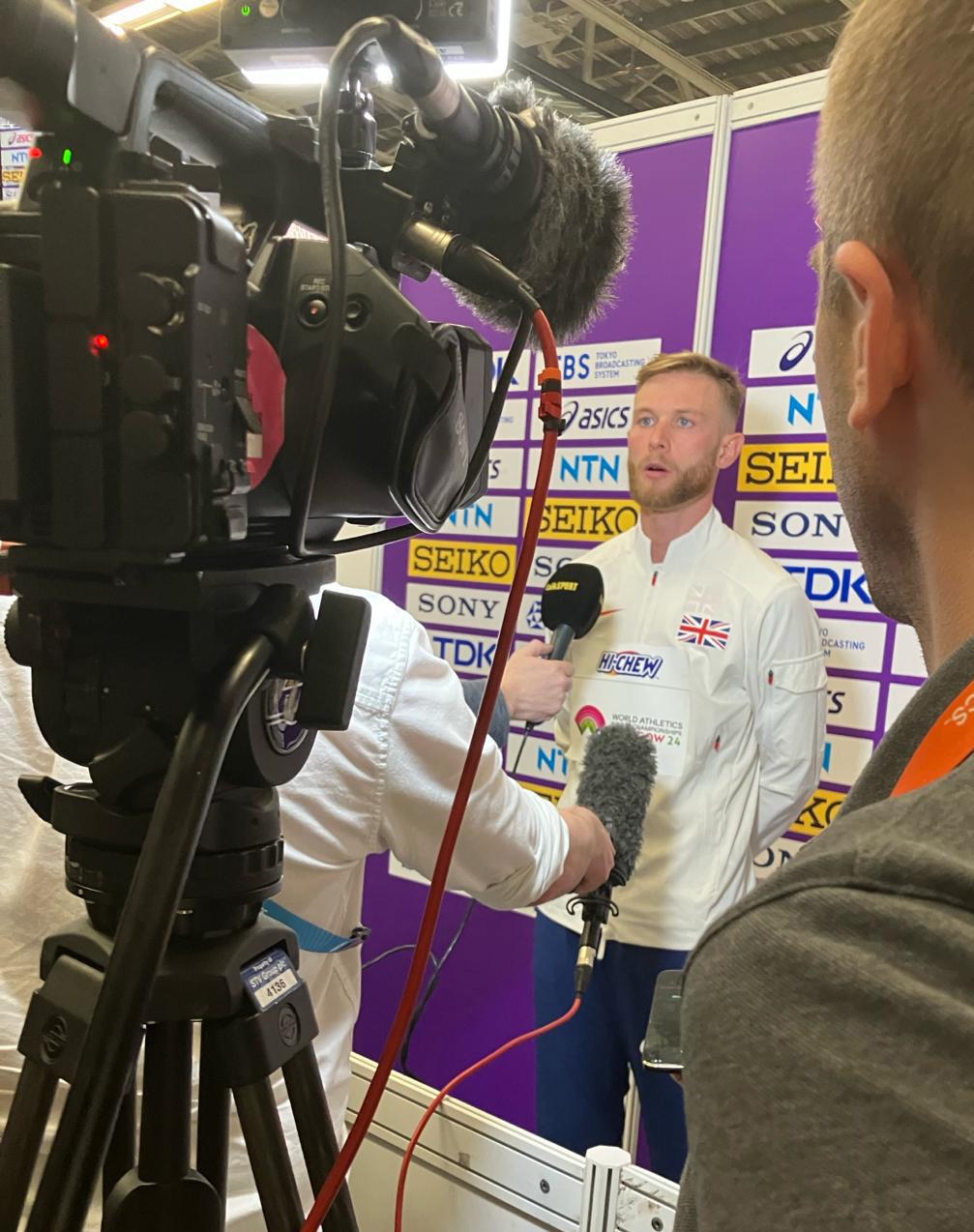
PB 2024 | ISSUE 1 20 Josh Kerr

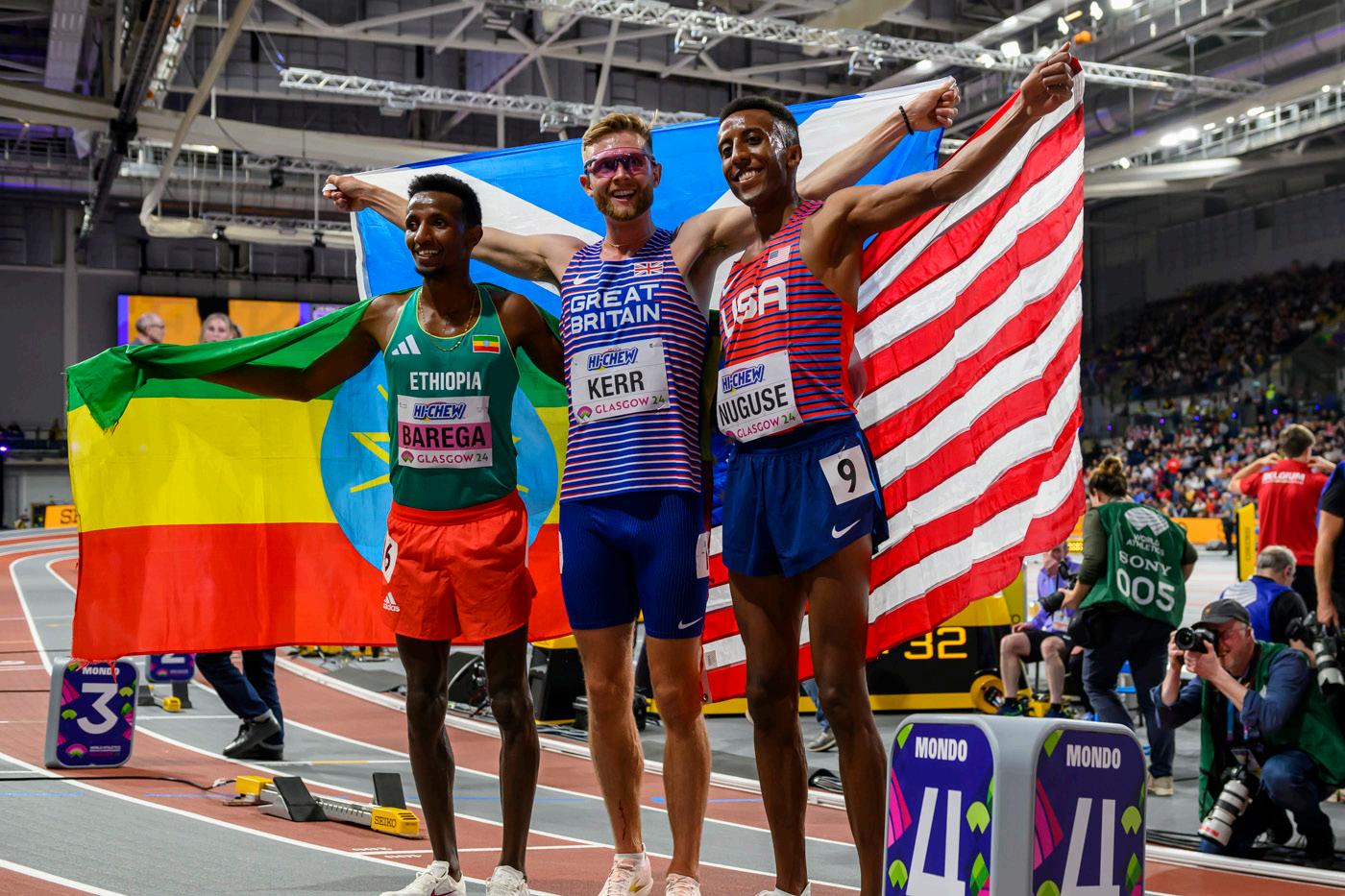

COE ON KERR GOLD
‘I thought Josh physically and mentally he had the measure of everybody’
Seb Coe
And, yet, it was almost as if his rivals in Glasgow were unaware. Either that or thought they might out-kick him.
One move with 800m remaining was enough to propel Josh into firm contention and come the last 400m or so and the aforementioned Cram, on BBC commentary, and those inside the stadium had little doubt about the outcome.
‘The race plan was pretty fluid, I didn’t come in with a firm tactic or strategy,’ said Josh.
‘I made that move with four laps remaining simply because I didn’t want anyone getting too much or a gap on me. I felt good, I was running well and I felt I had a couple of gears left.’
Josh pulled up alongside defending champion and Olympic 10,000m gold medallist Selemon Barega and while the Ethiopian held him off initially it almost seemed as if the Scottish crowd would catapult Kerr to the front.
Sure enough, the decibel levels increased further as Josh edged ahead and then, suddenly, the ‘race’ was over and it was a run for home.
American Yared Nuguse finished fast to edge Barega out of silver. Josh? He was already off and running on his lap of honour by then.
‘My coach, Danny Mackey, was real annoyed with me at the Millrose Games when I set the Two-Mile indoor best as I didn’t run through the line. He doesn’t want me getting bad habits.’
Maybe that explains why Josh barely dropped his pace for the first 100m or so of that glorious lap of honour . . .
‘Ha, that was a little embarrassing but it was a great moment and hopefully the crowd enjoyed it,’ smiled the Edinburgh AC favourite.
‘I had family and friends there and I really wanted to come here and put on a show for Scottish and British fans. The roar of support was the loudest I recall in athletics.’
There were only a couple of hundred inside the Emirates some nine years earlier when Josh last raced 3000m indoors on these shores. A run of 9:11 at the age of 17 didn’t really hint at what was to follow.
‘I left for the States not long after that and I did so with ambitions to one day come back here as a champion. It’s just taken quite a few years!
None other than World Athletics President Seb Coe wasn’t in the least surprised at the outcome.
‘Josh has become physically imposing and intimidating now when he steps out onto the


track,’ said the double Olympic champion.
‘There was a lot of bumping and barging but you get that at 3000m indoors. You have guys coming down in distance from 5000m and 10,000m and others like Josh stepping up from 1500m. But he handled it all and I thought physically and mentally he had the measure of everybody.
‘He is in that purple patch of a career where when he goes into a stadium thinking he is going to win. And, worst of all for the others, they also think that’s going to be the case.’
Josh learned his race craft on the American collegiate scene and he won titles and records at NCAA level as a portent of what was to follow.
But there’s simply no dispute that his career was forged in Scotland via Edinburgh AC as he came through the pathway for athletics in Scotland.
He’s been vocal about the need to save Grangemouth Stadium and referenced many early year races at the Emirates. In short, Josh is passionate - and serious - about development.
‘It’s our job (to inspire young athletes),’ he said.
‘We need to run back to our club, go back to our school and show people what is possible. We ned to be a resource for people and say ‘this is my journey, this is my path’ and show that others can follow that.
‘Coming up through athletics in Scotland was great for me and I’m always happy to stress the point that the pathway is there.’
21 scottishathletics Josh Kerr

Officially a family affair
Mother-daughter double acts savour their World Indoors opportunity
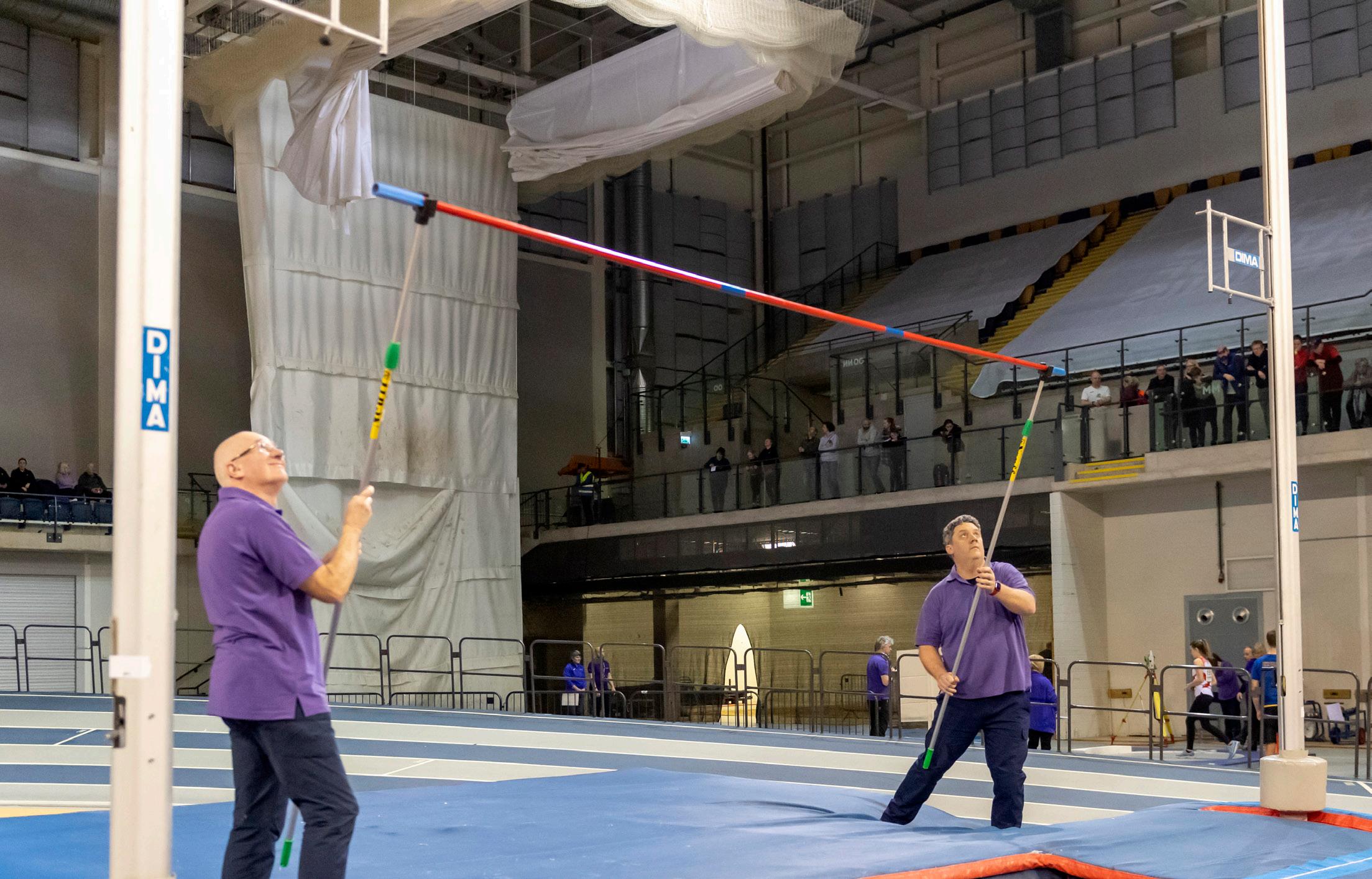
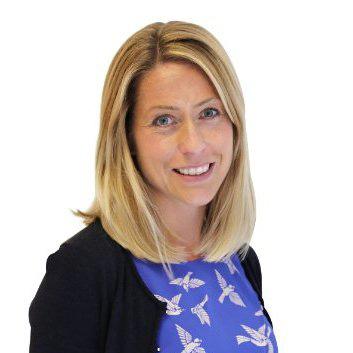 By Katy Barden
By Katy Barden
‘In our world of big names, curiously, our true heroes tend to be
anonymous,’ wrote American historian Daniel J. Boorstin.
Athletics creates memorable moments, spectators create atmosphere, but without Officials - the unsung heroes of track and field - competition simply couldn’t take place.
‘We’re there to do our best for the athletes,’ says Lorna Rogers, one of 25 Scottish officials selected as part of a 95-strong team for the World Athletics Indoor Championships.
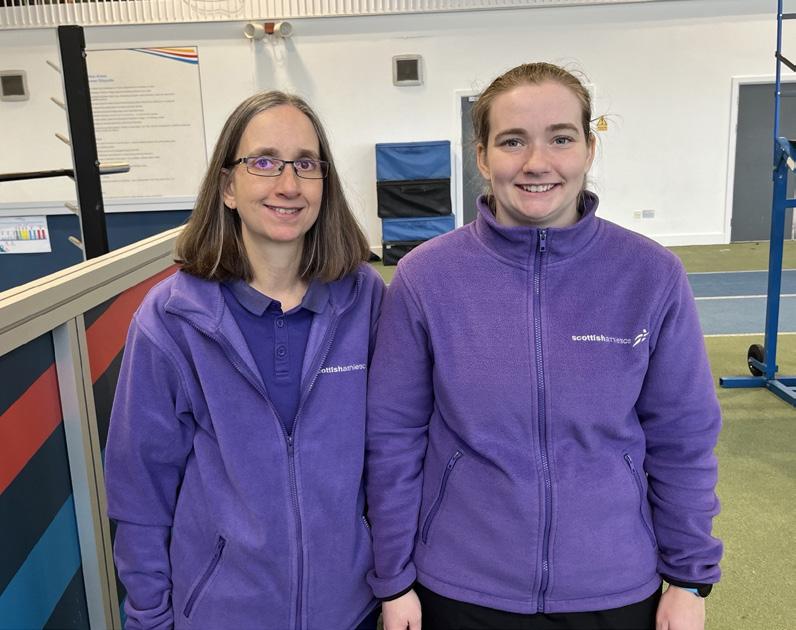

Lorna, a Level Four track Official and dentist in her ‘day’ job, was joined at the Emirates Arena by her daughter Lesley, a Level Two track Official. It was the biggest event to date they’ve been part of together.
‘I just followed on from her (into officiating)!’ laughs 19-year-old admin and IT student Lesley, pointing at her mum.
Lorna, who worked as a video room judge in Glasgow, has been a qualified Official since 2015 but has been involved in athletics for 42 years.
At the peak of her competitive career, she made British age group teams and represented Scotland in the sprint hurdles and 400m hurdles. She is also a qualified coach.
‘I was ‘helping out’ at league matches but it was in 2015, when my younger daughter was five, I just thought, ‘This is silly, I really should bite the bullet and get my qualifications’’, she says.
‘That’s how I got started.’
Lesley has been officiating for around three years but her relationship with track and field is as old as she is.
‘You were actually at the athletics track when you were two days old,’ her mum (who had been coaching athletes to the English
Schools Championships at the time) tells her mid-interview.
The pair, both competitive members of Dundee Hawkhill Harriers, have a shared love for the sport and are inspired to continue to learn and develop as Officials.
‘The camaraderie of the track team is just brilliant and I learn loads from them,’ says Lesley, who was selected for the Emirates as a call room judge.
The World Athletics Indoor Championships was the perfect platform to progress.
‘We’re there to be official, but we’re not there to make life harder for athletes,’ says Lorna.
‘At the end of the day, we want to do our best for the athletes, we want to see events go smoothly and to be good for the sport, and we want it to be good value for the spectators.’
‘I would encourage anyone to get involved in officiating and volunteering because it’s so rewarding in many different ways’
Scottish Official Lorna Rogers
PB 2024 | ISSUE 1 22 Officials

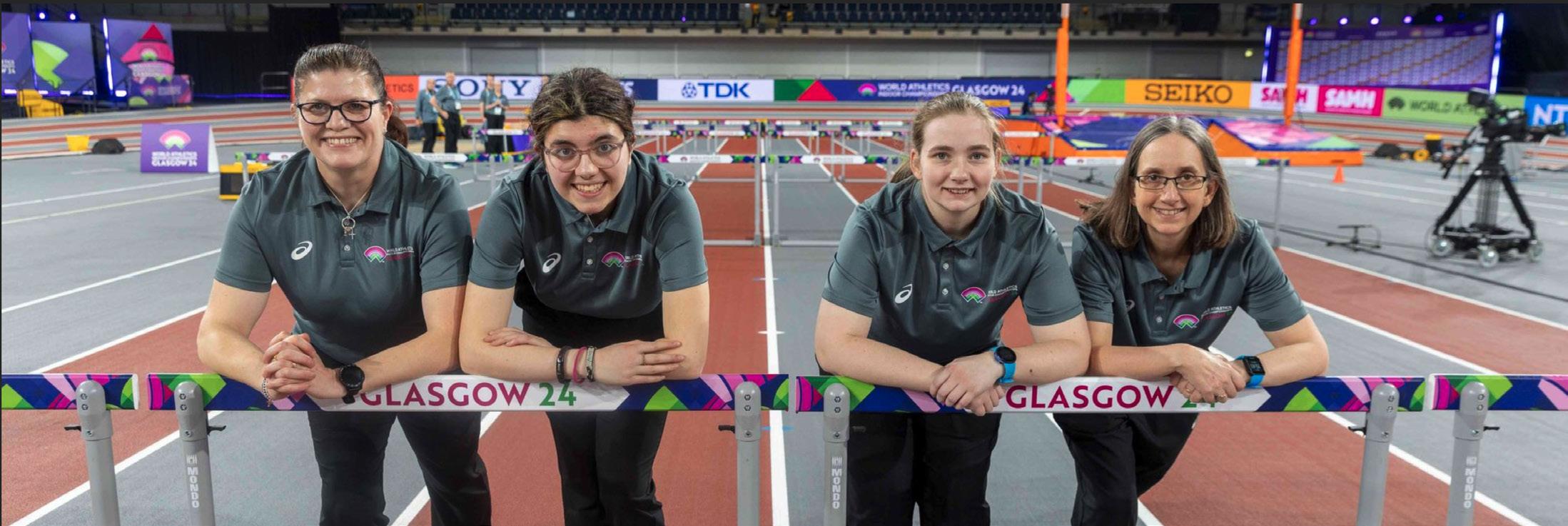
One mother-daughter pairing at a major athletics championship is fairly unusual, but to have two, as was the case in Glasgow, must be quite unique.
Lorna and Lesley Rogers were joined by Carol and Rebekah Rose (also Dundee Hawkhill Harriers) who were with the technical team and operated as a call room judge, respectively.
Adding to the family theme, Carol’s husband/ Rebekah’s dad and Carol’s son/Rebekah’s brother were also involved, on this occasion as volunteers.
‘I think that’s one of the things we all like about officiating and athletics in Scotland because the four of us can all be involved,’ says Carol who is a Level Four field Official, a Level One track Official and an endurance Official for cross country as well as a coach.
‘We can be at the same venue, doing the same event, but we can all be doing different things’
Carol, who works as a book-keeper and does accounts, has been an Official since 2017.
‘It was a case of starting off when Rebekah first started to compete,’ she explains. ‘It basically started out with raking sandpits, retrieving javelins and just generally helping out.’
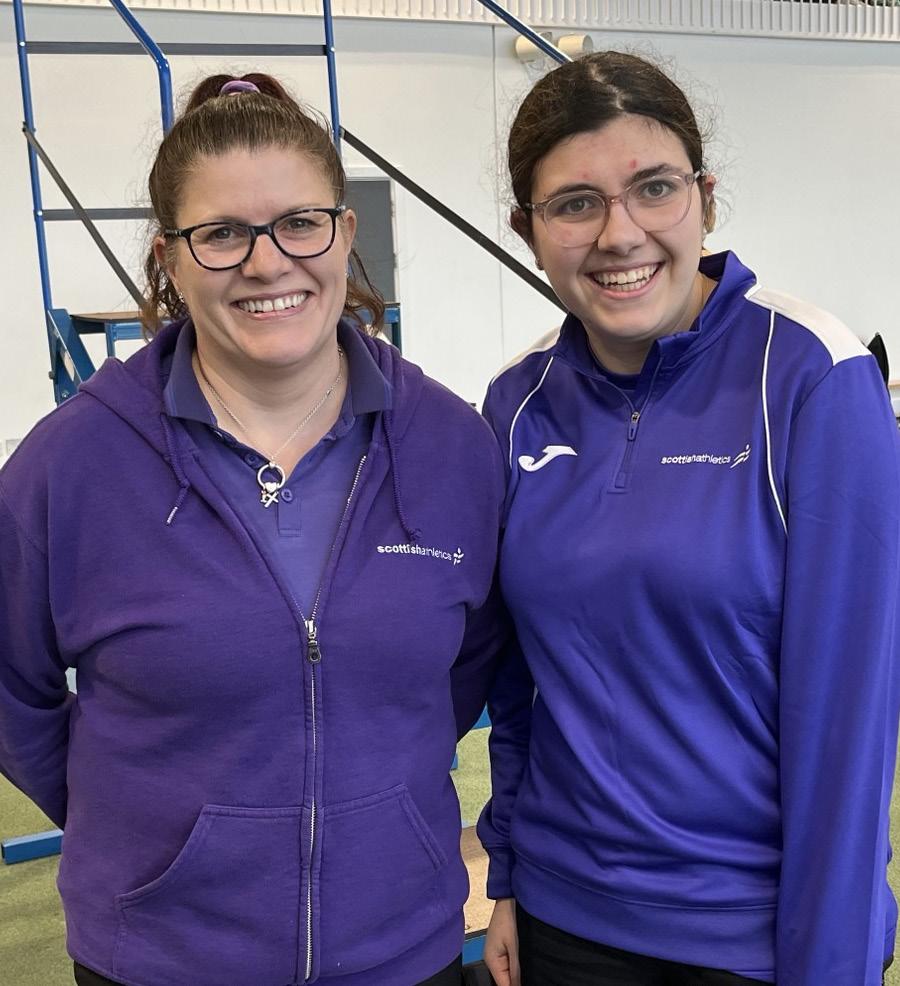
Rebekah, 21, is a pharmacy student at university in Aberdeen and still competes. A Level Three field Official, she has been helping out at events since she was a child and was selected as a young Official to do the 2019 European Indoor Championships in Glasgow when she was 16.
‘When mum and dad started to get into officiating my brother and I ended up getting dragged along,’ she says.
‘I remember helping out at the U12s SUPERteams and we absolutely loved it. We then went down to the national champs a few weekends later and I got asked if I wanted to help out in the call room. From there I really got into it and I did my Assistant Official award as early as I could.’
Both Carol and Rebekah take pleasure in watching athletes progress from their front row seat as Officials
‘I see people I’ve competed with from a younger age and now I’m officiating and competing and I’m seeing them come through . . . seeing their growth is so rewarding,’ says Rebekah.
‘That’s a bonus of the age and stage I’m at certainly, but I just enjoy seeing people come through and winning national titles. ‘
Like their clubmates, Carol and Rebekah were thrilled to work together at a major championship and enjoyed such a fantastic learning opportunity.
‘You can learn from other people who are more experienced than you and you see how the technical side of things play out on a higher level stage,’ says Carol.
The World Athletics Indoor Championships represented a fantastic opportunity for the Scottish Officials selected.
For those who might be interested in being selected for a future championships, it’s never too late to get started.
‘Age is no barrier to officiating or
volunteering,’ says Lorna Rogers in conclusion.
‘I would encourage anyone to get involved in officiating and volunteering because it’s so rewarding in many different ways.’

Getting started
The recruitment of new Officials is vital for our sport.
Whether you’d like to help rake a sandpit during a local club competition or develop to become an Official at a future world championships, officiating is open to people of all backgrounds and skill levels from across the country.
If you are new to athletics and interested in taking the first step on your volunteering journey, the Assistant Officials course is a good starting point. If you already volunteer for your local club or already have an understanding of athletics competition, you can sign up for the Level 1 course in your preferred officiating discipline.
For more information please contact: Shona Malcolm-Martin by email: shonamalcolm@scottishathletics.org.uk
23
Photo by Jeff Holmes
scottishathletics
Officials


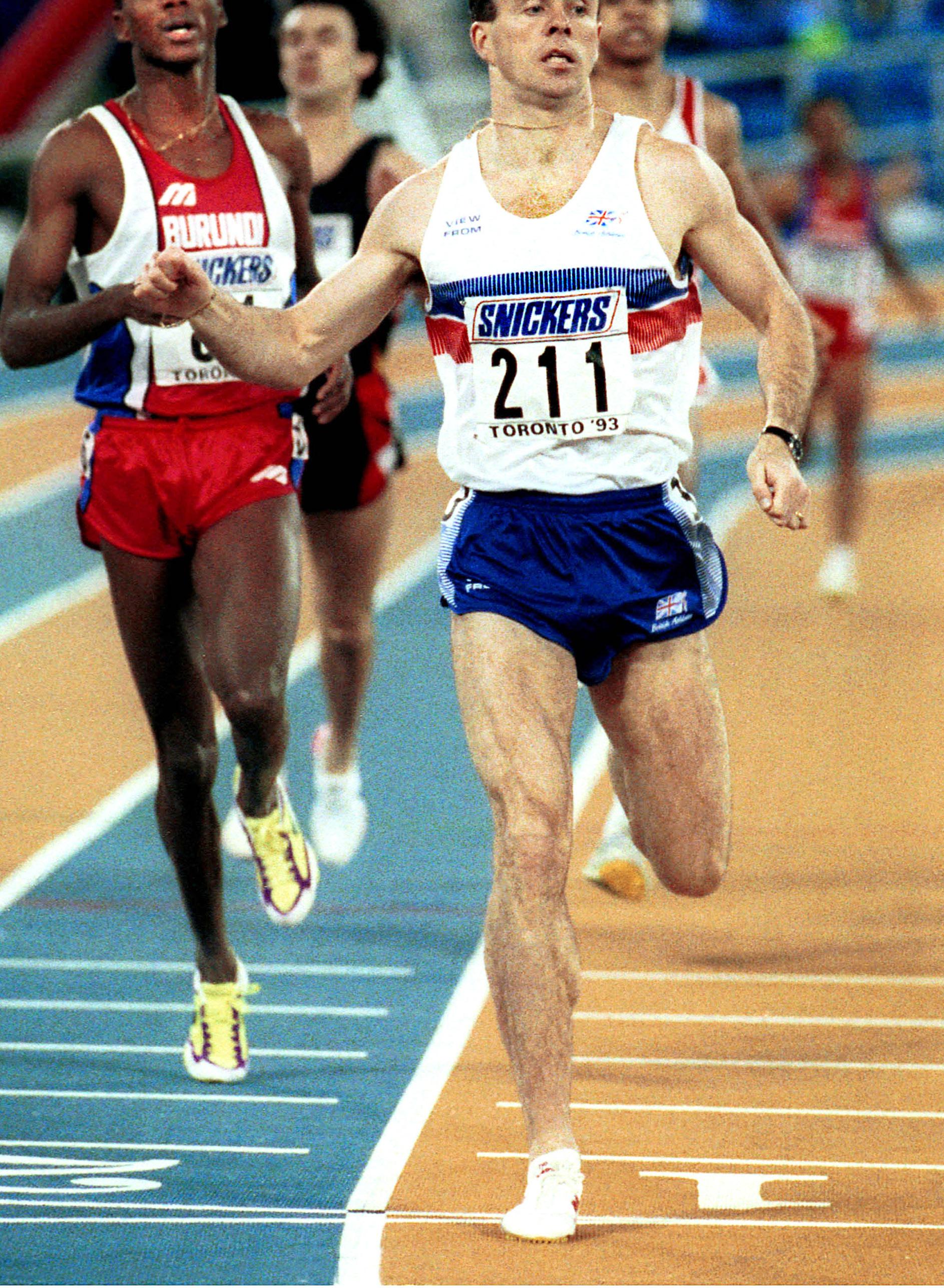
 By Peter Jardine
By Peter Jardine
Seasoned observers of Tom McKean would doubtless agree he was often a force of nature on the track.
But the glory years of the late 1980s and early 1990s – and the lows - might never have happened had he followed through on his initial ambitions for a career-switch from working as a labourer laying slabs for Motherwell Council.
McKean craved joining what is now known as Police Scotland (it was Strathclyde Police
back then) and indeed much later he did give lengthy service to the boys in blue.
The sliding doors moment arrived in the spring of 1985.
‘I almost joined the Police in 1985 and that would have ended my athletics career there and then – certainly at the very top level,’ recalled Tom in a special interview for Scottish Athletics.

‘I was struggling financially and I didn’t have the money to travel to big races around Britain or Europe.
‘Right at that point, joining the Police was my first choice career. I applied and went through the interview stage with the Police and they basically said: ‘Why not try and turn professional in your athletics and then come back to us after your sporting career?’
‘The UK champs were over in Antrim that year and I didn’t have the money to travel. But because I had done well as a junior, and because UK Athletics wanted to support the event (taking place effectively in defiance of The Troubles), I was suddenly given a free plane ticket to go to Northern Ireland.
‘I won my first UK Senior title in Antrim and a week later I beat Steve Cram at Gateshead which really announced me if you like.
‘Fate sometimes does that. I was honestly almost out the sport a couple of weeks earlier and then suddenly here I was – one of those athletes who comes ‘out of the woodwork’ and joins the cast-list for their event.’
Reflections on his career often bring mixed reviews and mixed feelings for the man himself. With the benefit of hindsight a few decades on, is there almost a parallel with Andy Murray?
McKean was a Scot performing at a rarefied level in a global sport but even in Britain he was up against a formidable trio in Seb Coe, Steve Cram and Steve Ovett. Shades of Murray and his generation of tennis legends (albeit not British).
‘It is exciting to see Scots doing so well in athletics and it reminds me of my own time in the sport with Coe, Cram and Ovett,’ said Tom.
‘Jake has been injured but he is coming back and hopefully it is all good for him on his return. Josh Kerr is phenomenal and he is not short of confidence.
‘Jake has bits to prove, Josh is World Champion and then you have Jakob Ingebrigtsen. But we know also that one or two others may come out the woodwork. That can happen in an Olympic year.
‘It could be Jakob’s Norwegian team-mate, who is coached by Jakob’s dad. The Spanish and the Kenyans are running well and are often a danger.’
The World Indoors in Glasgow brought him back into the spotlight – and rekindled memories of winning the Men’s 800m gold at the World Indoors in Canada in 1993.
PB 2024 | ISSUE 1 24
Tom McKean

‘Being World champion is something that never leaves you,’ he recalled.
‘It is like any other major title and it becomes a moment and an achievement you cherish.
‘It was over in Canada and I had to adapt to indoors. It was later in my career and to be honest I had not realised how good I could be, although I did win the European Indoor title in Glasgow at the Kelvin Hall three years earlier. That event in 1990 was the first time I had stepped on an indoor track.
‘I still have the gold medals from Glasgow and from Toronto and they mean a lot to me.
‘The question I am always asked about the World Indoors is about the medal ceremony because I almost missed it!
‘What happened was they had told us it would be 5.30pm for the Men’s 800m podium. They brought it forward by 30 minutes. At 5pm I was in the media area using a journalist’s phone (Doug Gillon of The Herald) to call home to my mum. Doug was jumping about and hauling me off the call to get down the stairs to receive my medal.
‘I ran down the stairs. The Officials were walking away but the athletes had stayed on the podium and I jumped up to join them. And the crowd gave me a brilliant reception there and then.
‘I enjoyed it and they still had the national anthem so it was fine, really.’
Watch it back on YouTube and the commentary of the late David Coleman captures the moment.
‘McKean ran the perfect tactical race,’ gushes Coleman.
Tom smiled at the recollection.

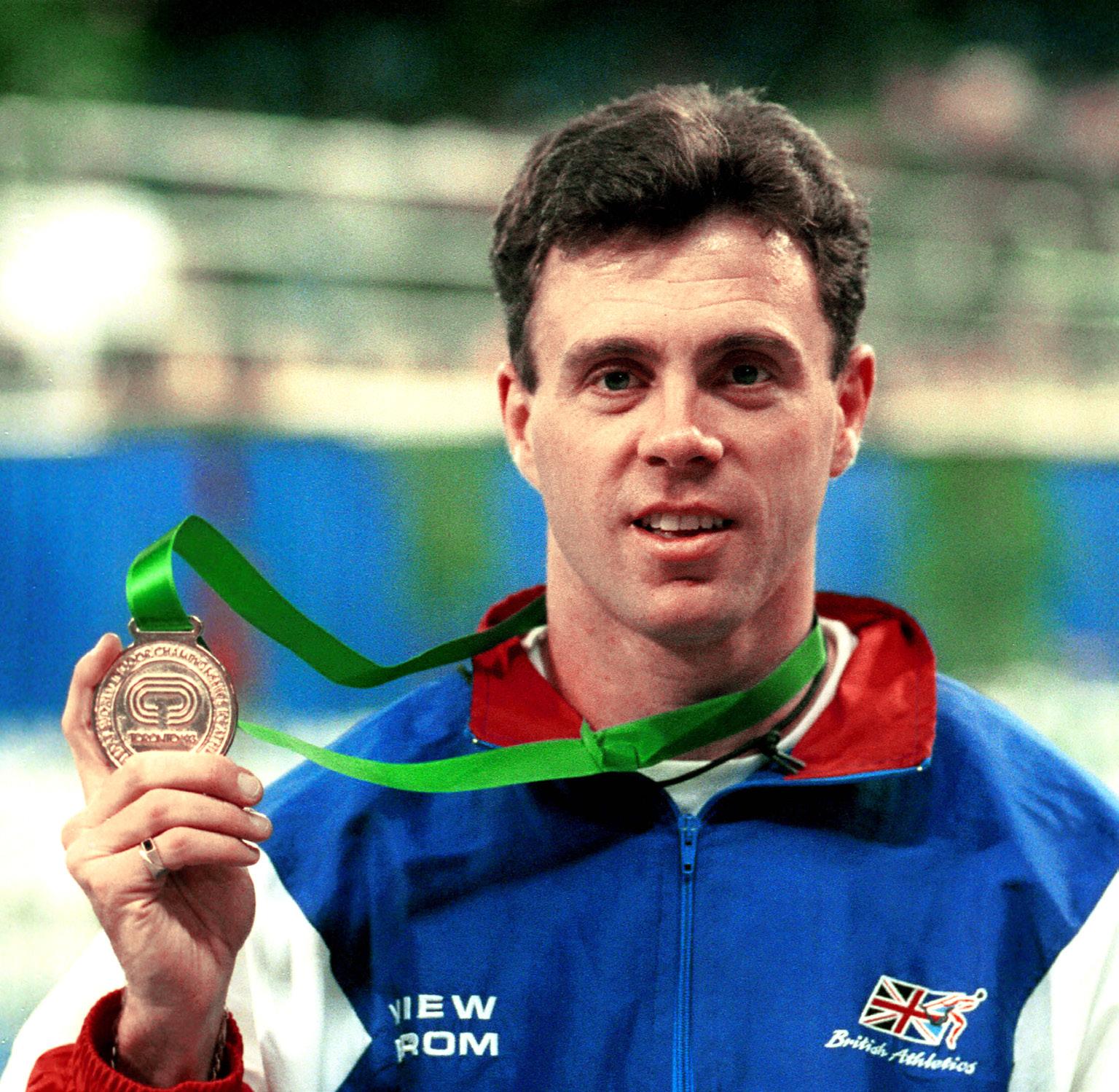
‘Tactically I ran really well. Opponents were getting bumped and barged behind me in the final but I was clear out in front and out of trouble that way. Basically I went to the front and stayed there.
‘Getting those tactics right was a great feeling for me.
‘It was gold for GB and NI of course but I also felt it was for Scotland. Yvonne Murray won gold in the Women’s 3000m and David Strang took silver in the 1500m.
‘So, at one point, it was as if Scotland was third in the medal table at the World Indoors – we had two golds and a silver. Fantastic. We are such a small nation so that was a great moment and a great championships.’
His police application no doubt still on file, he swapped vest and spikes for uniform three or so years later. Recently retired, he’s giving something back to the sport he loves.
‘I never went away from the sport – I just always said I would not coach while I was still in the Police,’ explained Tom, with his wife Julie also planning to take the Coaching Assistant course.
‘With the shifts I was doing it just wasn’t possible. Young athletes need continuity and I could not give that commitment to coaching and to being at training.
‘I am now with Motherwell AC and working
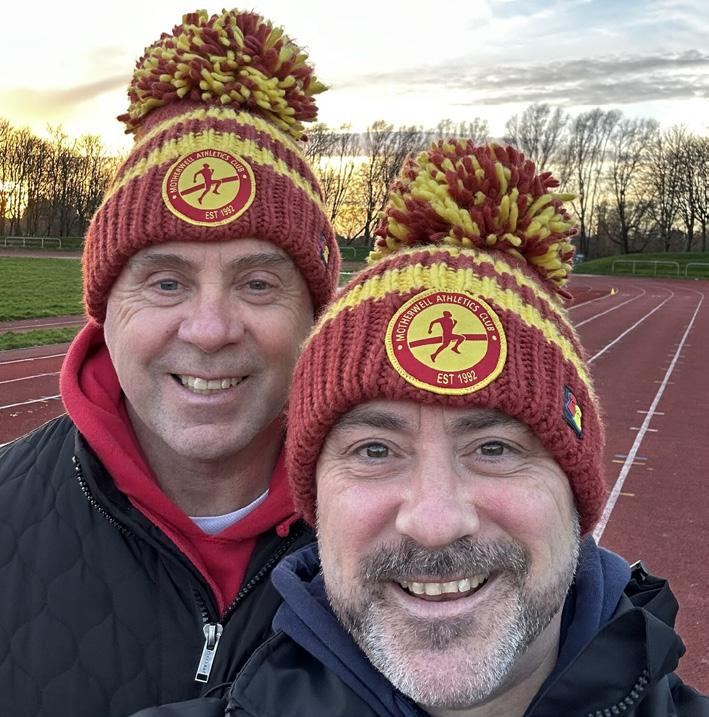
with nine-year-olds to 13-year-olds.
‘They know I once ran fast and they still want to beat me – in sprints! I am 60 now and, surprise, surprise, the kids are faster than me!
‘I am always trying to teach them the effects of training and what they will feel as they get fitter. I say there may be some pain so they can’t complain (when it happens).’
Looking back, McKean may well feel the gain outweighed the pain . . .
Toronto photos: Mark Shearman
Glasgow photo: Mark Gibson
25 scottishathletics
Tom
McKean

How Glasgow ‘smashed it’ for three days and three nights

 By David McCarthy
By David McCarthy
People make Glasgow, so the slogan goes.
Well, for three days over the first weekend in March people from all over the world made Glasgow the epicentre of World athletics.
And, typically, they were greeted with a mixture of grins and gallusness, the likes of which few cities can come close to matching.
The flags that fluttered in the stands told us that they’d come from the Bahamas and Belgium and everywhere in-between to savour a global championships that may have been slightly lighter on some of the biggest names, given that the Paris Olympics is looming large, but with enough athletics royalty on show to more than satisfy the sell-out crowds that flocked to The Emirates.

On day one, there was even the sight of a Swedish Henrik Larsson winning his 60m sprint heat in the shadow of Celtic Park.
Christian Coleman and Noah Lyles were the American big guns in that event; Mondo Duplantis, under the same roof in which he broke the world record in 2020, retained his pole vault title and Holland’s Femke Bol made running the 400m women’s event look like a stroll on nearby Glasgow Green, even when smashing the world record on day two of the championships.
Then there the Brits. Or, more pertinently, the Scots.
On Super Saturday, the crowd prayed for a double tartan triumph with Laura Muir and Josh Kerr running their respective 3000m finals back-to-back. Muir had chosen the event to build up her endurance ahead of Paris and found herself in a stacked field and out of the medals in a highly credible fifth, despite being roared on by the capacity crowd.
That turned out to be the appetiser before the main course, served up by Kerr who rampaged to glory, riding a title wave of emotion that swept round the arena as 6500 fans threatened to raise the roof, making a racket that could be heard from Dalmarnock to Kilmarnock.
It was magical and 35 minutes later, they were at it again as Molly Caudrey soared to pole vault gold for GB.
Jemma Reekie hoped to emulate Kerr and Caudrey on the final night of competition and while her disappointment at finishing runner up was evident in the immediate aftermath, a first global medal was pouched with the hope of more to come in the French capital this summer.
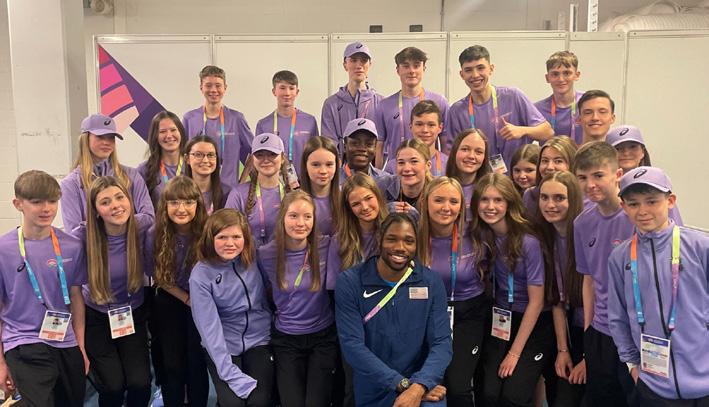
But with any sporting event, the players on the stage are only part of the story.
Sitting in the audience watching the mother of GB’s pentathlete Abigail Pawlett go through an emotional wringer two rows in front of me was a reminder of how I feel every time my own teenage son - a kit carrier on Friday night - laces up his spikes.
Abi got off to a flier with a great 60m hurdles display, only for her mum, looking through the cracks in her fingers, to tell those around her: ‘We’ve still got another four of these to get through!’
Then there was the undiluted joy of the Belgian couple sitting right behind me on hearing that their son Tibo de Svet had made the semi final of the 800m as one of the fastest losers after an agonising wait as the remainder of the heats unfolded. It clearly meant everything to them and was heartwarming to witness.
For three days and nights, six sessions of sporting drama, Glasgow smashed it.
Then again, was there ever any doubt?
A venue like the Emirates, filled with such knowledgeable and enthusiastic supporters, was always going to bring out the best in the athletes who converged on the city from every corner of the planet.
They didn’t disappoint and neither did the folk who watched them.
PB 2024 | ISSUE 1 26 Glasgow Reflections
Photos by Bobby Gavin
European Capital of Sport recognises and celebrates the people of Glasgow!
This year, we are Changing Lives through School Sport, Community Sport and Health Sport by supporting ageing, building wellbeing and promoting connections within and between diverse communities.




Visit
to see who's
the website
making a difference


Larkhall making giant strides one leap at a time

The theory of marginal gains was made famous by Dave Brailsford in his role as performance director of
British Cycling.
A similar principle has been adopted by Larkhall YMCA Harriers in their bid to make the club more accessible and to reduce some of the barriers to taking part in sport.
Larkhall YMCA Harriers was founded in 1930. David Gracie - one of only two members to win a Scottish national senior title (the other being William Morrison over 880 yards in 1960) - is the club’s most distinguished member.
A former Scottish record holder, he represented Great Britain in the 400m hurdles at the1952 Olympic Games in Helsinki. According to the excellent history on the club’s website, ‘within four short years, (he) was to transform the profile of the club within the Scottish athletics community’.
While Larkhall’s athletes continue to grace the podium nationally and on the UK stage, today it is the club’s online presence and

from the crowd.
‘I was in Larkhall for about five years before I knew a running club existed,’ says YMCA President and club media and Welfare officer Ted Zokas.
‘Nobody knew it was there unless they knew it was there. And I thought, ‘Let’s change that’.’
Current club membership is 60 across junior and senior sections, but YMCA secretary Willie Mowbray is keen to see general membership return to around 75 in the coming year, with at least 50 of those being competitive members.
In addition to a ‘feeder’ group for five to eight-year-olds and an after school club held in Glengowan Primary School, both of which are proving highly successful, the club is now experiencing a significant boost from the launch of its new website - created by Zokas - in October 2023, together with its creative social media presence.
‘Ted’s work has been transformational,’ says Mowbray.
A case in point is the Larkhall YMCA Harriers TikTok training video that received in excess of 35k views. That translated into a number of membership enquiries from parents of potential young athletes who had seen it.
‘From my background in the police I see the effects of poor mental health, poor welfare, and poverty and deprivation every day, so I thought I’d address it best I could.’

With an effective communications strategy in place, Zokas is now using his personal experiences to positively impact the club’s accessibility through the creation of a local campaign to remove #Barrierstosport.
‘We’re based in an area that has pockets of deprivation, so I knew that there would be people who might like to try athletics
Having identified lack of access to period products as a barrier to sport for young girls and women, Zokas worked with Larkhall’s female members to provide supplies at the club.
It was a simple, low-cost action that effectively tied in with the club’s support of jogscotland’s #MenopauseFriendly campaign.
Similarly, while a new club shop was launched in January to enable members to purchase good quality brand-new kit, the club’s ‘Sell it, Swap it, Gift it’ Facebook group went live in parallel to promote kit sharing at a reduced cost and remove another #Barriertosport. It also cuts waste.
Research from This Girl Can (www. thisgirlcan.co.uk) shows that 48% of women prefer not to be active outside after dark. The club has responded by creating a simple video on women’s safety which is available to members and non-members.
Club fees have also been frozen since 2019 with the aim of reducing the cost barrier to prospective members. For those who do choose to try out the club, their first two sessions are free.
‘You hear about ‘incremental gains,’ says Zokas. ‘The way I see it is that all these little changes add up to someone joining an athletics club. It’s all the little things... they might not seem a lot, but when you add them all up, that’s what makes the difference.’
PB 2024 | ISSUE 1 28 Grassroots Athletics Larkhall YMCA


Scottish women’s running burns brightly with thanks to those who carried the torch
 By Katy Barden
By Katy Barden
The passing of distance running icon Leslie Watson was a reminder that we all stand on the shoulders of giants.
Like Dale Greig before her - who had become one of the first women to run a marathon and set a women’s world best for the distance - Watson took the sport forward so that future generations could go further and faster.
A Scottish mile champion in 1966 and a
multiple national cross country champion (twice narrowly defeating Greig), Watson went on to become a prolific marathon runner with a best of 2:44.18 in 1982 and over 60 marathon victories around the world.
The Maryhill Harrier also paved the way for women in ultra-distance events. In 1979 she finished the first female in the London to Brighton race over 54 miles despite being an unofficial entrant due to women not being permitted. She defended her title in 1980, receiving a trophy and deserved recognition for the victory after organisers changed the rules to let women run.
At the peak of her career, she ran a 50 miles world best of 6:02:37 in Connecticut, United States.
Freya Ross

‘If (Scottish marathon pioneer) Dale Greig broke through the glass ceiling keeping women out of marathon racing . . . .then Leslie shattered it,’ stated the Scottish Distance Running History website.
Theirs wasn’t a story of performance alone, however. It was in equal measures a story of inspiration, participation and a love for the sport
that has influenced generations of female endurance runners ever since.
It’s also a story that has been repeated, to varying extents, throughout the decades.
Olympian Freya Ross (née Murray) is ranked fourth in the Scottish all-time marathon rankings with a best of 2:28:10. As a young athlete, she was motivated by Scottish women who were competing at the highest level.
‘I really looked up to Yvonne Murray and Liz McColgan,’ she says.
‘I also looked up to people competing in the same age group, or the age group above me, trying to get closer to beating the likes of Dennise Smith, Colette Fagan, Susan Partridge and Sheila Fairweather.
‘I started running at a young age, so the athletes competing in the Olympics were inspiring but seemed very far removed from what I was trying to achieve (at the time). My aims grew as I got older.’
Ross and Partridge were an exciting duo at their peak. Ross won the Scottish National Cross Country Championships six times out of seven between 2006 and 2012. Partridge won in 2008. Both raced for GB and NI at World and European Cross Country Championships.
Ross ran her marathon best in London (April 2012). Partridge ran her marathon best of
PB 2024 | ISSUE 1 30 Grassroots Athletics Women’s Running
2:30:46 (eighth all-time) in London in April 2013. Ross represented Team GB in the marathon at the Olympic Games in London 2012. Partridge represented GB and NI at the World Athletics Championships in Daegu 2011 and Moscow 2013. Both athletes represented Scotland in the Commonwealth Games, Ross on the track in Delhi 2010, Partridge in the marathon in Melbourne 2006 and Glasgow 2014.
‘Susan and I were both coached by Steve Jones and trained together a few times in Boulder (Colorado),’ explains Freya.
‘I really enjoyed training together, we were pretty closely matched generally, but we had different strengths and weaknesses. Our good days and bad days didn’t always coincide so I think we spurred each other on.
For the Falkirk Victoria Harrier, having another Scottish athlete with similar goals was beneficial. ‘Susan and I were both coached by Steve Jones and trained together a few time in Boulder (Colorado),’ she explains.
‘I remember watching her on TV competing in the World Champs in Moscow, I was so happy for her to run so well in such difficult conditions (she finished 10th). I would have loved to have been competing with her at the Commonwealth Games in Glasgow.’
Before Ross and Partridge made waves, Kathy Butler and Hayley Haining – fifth and sixth in the Scottish all-time marathon rankings with bests of 2:28:39 (2006) and 2:29:18 (2008) respectively - were at the forefront of Scottish endurance running.
Ross recalls being on GB teams with Butler when she was still a junior and ‘bombarding

her with questions.’ They later trained together in Boulder.
Performances have moved on since then. Two-time Olympian Steph Twell, a former world junior 1500m champion and multiple medallist at European Cross Country Championships, broke the Scottish marathon record in 2019 with 2:26:40, while Steph Davis went third on the all-time rankings with 2:27:16 in 2021 (prior to representing Team GB at the Tokyo Olympic Games).
But progress is not limited to times. Women’s endurance running in Scotland has moved forward in other meaningful ways, too.

Ahead of February’s Lindsays National Cross Country Championships in Falkirk, it was confirmed that 2277 athletes were on the start list, the fifth largest entry in the event’s history. Notably, that figure included 398 Senior women, a significant increase on the early 2000s when the number was consistently under 200.
Sandra Hardacre, a member of the Road Running and Cross Country Commission and with key roles at East District level, believes the most significant changes include the number of races on the calendar - and in turn the opportunities available to women compared to the days of Greig and Leslieand the move to equalise cross country race distances for men and women since 2017.
An increase in overall participation has had a substantial impact, too.
‘That’s one of the biggest things for me,’ says Hardacre, who was a Scottish agegroup cross country champion herself in 1975.
‘I think it’s becoming more about staying healthy. It’s about taking part, and it’s great that people are getting out there.’
And at the heart of it, perhaps that is what’s most special about endurance running;
creating friendships, enhancing physical and mental health, and being motivated and inspired by others to achieve your goals.
‘There is great camaraderie at our club,’ says Ross.
‘I hardly ever even make it down to training sessions, but I still feel part of a group of like-minded people.
‘If you have people to train with, people to support you on the good days and bad days, and people who think being a runner is a positive normal thing, I think it makes it all the more plausible to achieve your goals, whether that’s being a professional athlete, being the best in Scotland, or being the best in your age group at your club.”
Looking to the future, both Hardacre and Ross believe that Eilish McColgan could transform how people view Scottish women’s marathon running. It’s an exciting prospect. Like those before her, McColgan has the opportunity – when the time is right – to take the sport forward.
Standing on the shoulders of the giants before her, she could mark the start of another decade of progression and participation.
Leslie Watson running the London to Brighton race in 1979 (photo by Mark Shearman)
31 scottishathletics Grassroots Athletics Women’s Running
Sandra Hardacre
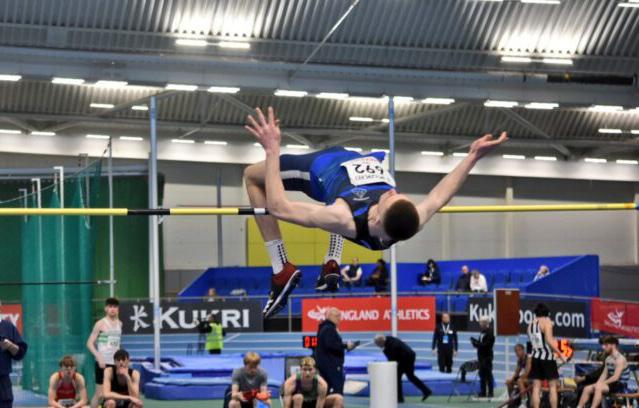
Raising the bar
Matthew Tait won the England Athletics U20 High Jump gold with 2.10m PB leap. On way back north from Sheffield, Matthew and coach Allan Smith posed for a fun Border medal pic.
Here, coach and athlete tell us more . . .
Allan Smith
How long have you been coaching Matthew?
I have been coaching Matthew since 2019 from first year U15.
Currently we are training four days a week. 1 sprint session, 1 weights session, 1 plyometrics session and 1 high jump session per week. I train with Matthew in person three times a week, with the Wednesday sessions being taken by combination of Emma Nuttall, Moira Maguire, John & Anne Scott.
Currently the only remote sessions taking place are with the guys up in Stornaway. Bringing home two medals at the 2024 Scottish championships for Ewan (U17) and James (U15).
It can be difficult for young athletes in their late teens – how much do you have to work at keeping it fun while also progressing?
In your late teens, it’s crucial to define your athletic goals while maintaining an enjoyable training environment. Incorporate music into workouts to add a fun element and enhance motivation. Introduce creative exercises that loosely align with your specific event, injecting variety to keep training engaging. Ensure that the focus on goals doesn’t
overshadow the enjoyment of the sport. Mix structured training sessions with occasional games or activities related to your discipline.
Balancing seriousness with enjoyment creates a positive atmosphere, promoting sustained commitment to training and personal growth.
How much potential do you think he has ?
Matthew’s potential as a high jumper is underscored not only by his impressive progress during the winter period but also by the maturing attitude towards the demands of becoming a successful athlete.
His dedication and resilience are evident in his commitment to refining not just his physical abilities but also his mental fortitude. This holistic approach bodes well for Matthew’s future, indicating a promising trajectory as he develops both skills and mindset.
Your own development took you to a high level – do you draw on experiences from your own career to help your coaching?
Transitioning from a professional athlete to a coach has been an invaluable journey, offering insights and knowledge crucial for personal progress.
In assuming a role once guided by seasoned coaches like Darren Richie and Bryan Roy, I’ve not only gained a deeper understanding of the intricacies of the sport but also cultivated leadership skills essential for effective coaching.
Drawing from my own experiences as an athlete, I can relate to the challenges and aspirations of those under my guidance, hopefully fostering a better coaching approach.
Whose idea was the Border stop photo and did you get a lot of reaction on social media ?
The Scottish border sign was a very lastminute decision by myself, all in good fun as we were driving by on way back from Sheffield. Memories to look back on in 10 years with hopefully plenty more successful trips to come.
A gentle reminder also that Scotland is a small country but a force to be reckoned within British athletics. There were many
positive messages on social media mainly from Scots (with a light hearted message from Denis Doyle about Hadrian’s wall needing to be rebuilt).
Matthew Tait
How long have you been in athletics?
I have been competing in athletics since I was 11.
Did you do other events before high jump?
Starting out at Lasswade I competed in both long and high jump competitions until U15 when I decided to make high jump my only event.
What do you like about high jump –training and competition?
As much as I enjoy all aspects of my training I am driven by my ambition to succeed. I enjoy the competitive atmosphere created at events.
What was it like to wear a Scotland vest at DNA a couple of years ago at 16. Did that help confidence?
I have always seen the opportunity to wear a Scotland vest at any competition as an honour. To wear my first Senior vest at a competition like DNA at 16 exposed me to the talents of older athletes. This allowed me to gain insights to the standards set by Seniors, and understand my capability of competing at the same level.
How much did it mean to win England Athletics U20 title with a PB on the day?
It was a rewarding experience to travel to England and earn the win and PB that I felt capable of.
I’m so pleased to have achieved this for myself and my club; Dunfermline Track and Field. Having gone to the competition ranked lower than some of my competitors, I knew to secure this title I had to have the right mindset and be confident in my abilities.
To gain two new PBs alongside my win has boosted my confidence for future competitions and rewarded my recent increase in training.
What do you do outside of sport –college, apprenticeship? Are there things you can do every day to improve (exercises, diet etc)?
Outside of athletics I am balancing a full-time modern joinery apprenticeship. This is quite a heavy workload to maintain on top of my athletics, which I make up for by keeping on top of a healthy and hydrated diet and regularly stretching.
PB 2024 | ISSUE 1 32 Grassroots Athletics High Jump
SUPPORTING ATHLETES AND BUILDING


Running in the family
Andrew aiming to be carbon copy of Frank – without help from ‘new shoes’
 By David McCarthy
By David McCarthy
He won a GB and NI vest at the age of 19 in December but Andrew McGill isn’t the type to get too far ahead of himself.
Not when a glance at the record books shows he is still almost nine seconds behind his 71-year-old grandad over 1500m.
Okay, to add a bit of context, Andrew’s Papa IS an Olympian with a fifth placed finish at the Montreal Games of 1976 and a fourth spot at the Commonwealths in Edmonton two years later. Frank Clement’s 1500m PB of 3.35.66 set in 1978 remains inside the Scottish all-time top 10.
So there’s no shame in his talented teenage grandson not quite reaching the world class levels he achieved.
Not yet anyway.
But there is a glint in Andrew’s eye and a smile on Frank’s lips as they discuss a family tie and a common ambition.
For Andrew, it is to beat his Papa’s PB. For Frank, it is to be there cheering him on as he does it.
‘Inch by inch, that’s what it’ll take and Andrew has got it in him, I’ve no doubt,’ says Frank.
disciplined in his running, doing all the right things and making sure he doesn’t overtrain, which is so important because so many talented athletes do that at a young age and are eventually lost to the sport.
‘Andrew takes it seriously, but combining his athletics with student life is giving him a good balance.
‘I was thrilled for him when he chosen for the GB Euro Cross U20 team in Brussels in December. It shows how much progress he is making.
‘And I was also happy to hear him being interviewed and saying his ambition is merely to be the fastest in his family. I’d love him to overtake my time, I really would.’
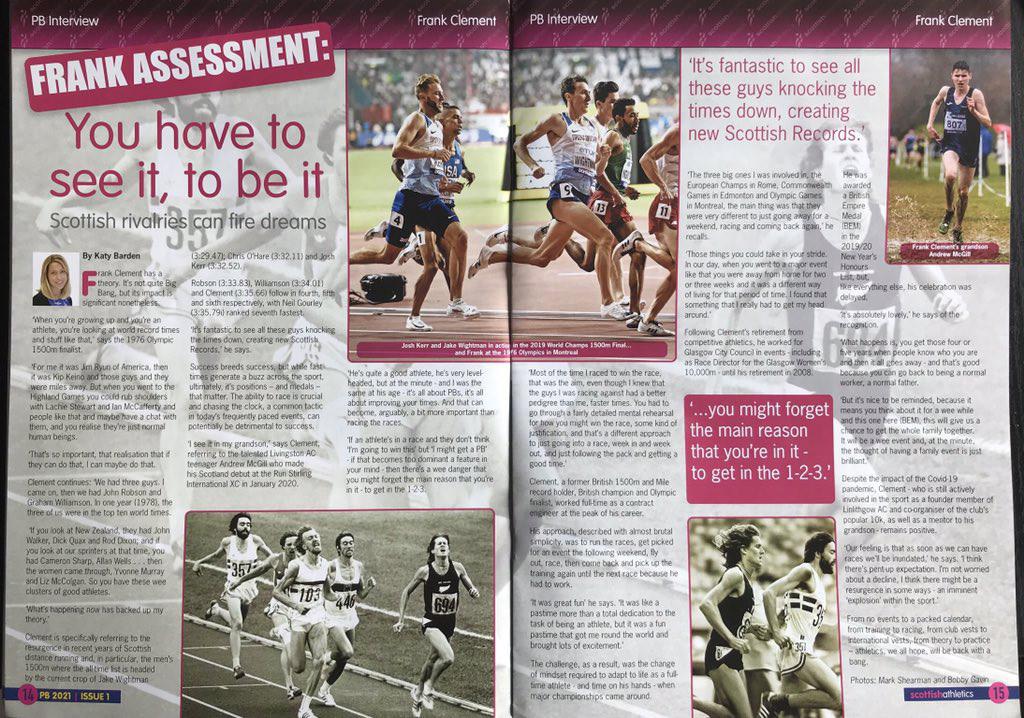

Andrew, who is studying computer science and runs with Livingston AC and Glasgow University Hare and Hounds club, represented GB in cross country but it’s on the track where the Linlithgow-born athlete believes he’ll be competing most often in the future. He is regularly to be found at Glasgow’s Crownpoint performing under the watchful eye of coach Mike JohnstonThat, of course, is where his grandfather made his name and McGill is happy to be following in his spike marks - and is so determined to beat Clement’s time on a ‘level playing field’ that he refuses to wear carbon plate running shoes.
‘My Papa’s times and achievements are really inspiring,’ he admits. ‘But even from the perspective of the way I got into running, he’s been a massive influence.
‘When he finished running, he had a big career with our local council and his work with Linlithgow Athletics Club and in setting up the Linlithgow 10k and Fun Run was massive in getting me involved in athletics.
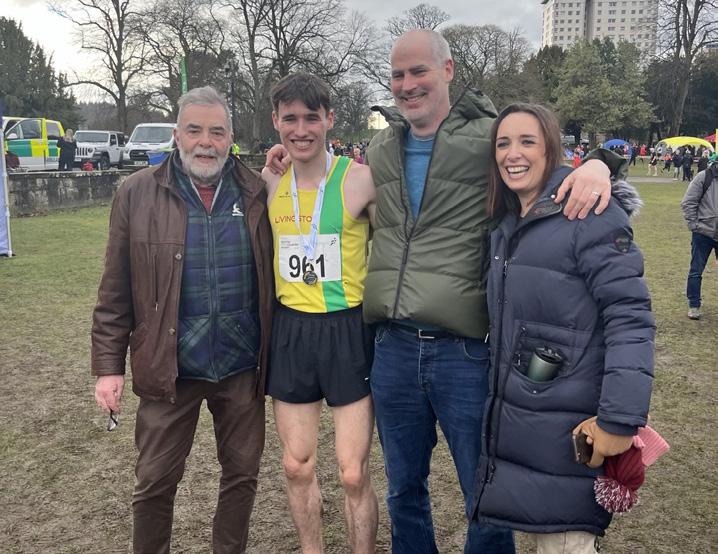
PB 2024 | ISSUE 1 34 Grassroots Athletics Andrew McGill/Frank Clement
Andrew McGill wins U20 Men’s gold at the Lindsays National XC

‘I did the Fun Run from when I was about seven years old and that was my first taste of running.
‘My parents also ran but with my Papa setting up that race, I did it every year until I was 15 - and didn’t win it until my last year!
‘I’ve still got a way to go, but now that I am getting closer to his times, I appreciate just how difficult it is. He was really quick.
‘He got injured just as he was coming to his peak. He put his foot down a rabbit hole or something like that in 1979 and broke his back. Although he tried to make a comeback, it was pretty much a career ender at about 27 or 28 because back then they didn’t have kind of luxuries we have now in terms of physios and scans.’
Or footwear for that matter.
‘I have a good pair of spikes without carbon in them and to be fair, they are much better than the kind of plimsoles my Papa ran in!
‘But I am still staying away from the carbon plates. He didn’t have that edge and if I am going to for his time it has to be run in
relatively similar conditions to be valid.
‘Psychologically, it gives me a wee boost when competing to know that I’m NOT wearing them. I’m still improving right now, so I’m almost saving them for a time when I really need them.
‘At the moment, I don’t really need that extra one percent. My Papa has told me there will be a year when I don’t improve. That will be tough and it will happen, so I’d like to save the carbon plates until that year comes and then maybe I can squeeze out another second or half second.
‘I think I will be more of a track runner and I’m looking forward to getting back to track to see if this good form in cross country is going to translate into faster track times.’
Good form in XC is an understatement. He rocketed into the GB team for Brussels and having had a taste of top level action, he’s desperate for more of the same.
Andrew adds: ‘It was brilliant. It feels like one of those things that you just want to get your foot in the door. A lot of people regard trying for that GB vest as a bit of a monkey on their
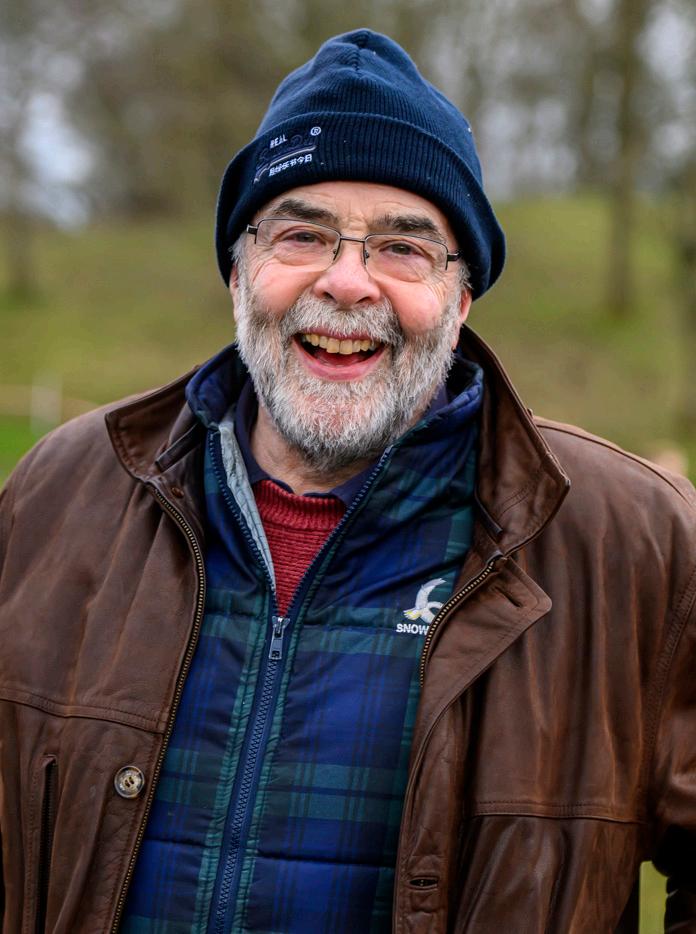
back, so to get one so early was great. ‘I just tried to soak it all up because it’s not one of those races you get to go to very often, so I just loved it.
‘It has given me more motivation. Some people might rest on their laurels having done that, but after having that wee taste of it,. I want more.
‘You see other guys who are established and get picked every year and I think I’d like to make that happen for me. It will require a lot of hard work.”
That’s something neither Andrew nor Frank have been afraid of and nobody will be happier than the elder statesman of the family if his grandson can emulate his feats.
‘That would be great,’ Clement said. ‘But as long as he’s happy doing what he’s doing, that’s the main thing.
‘If he beats my time, we’ll have a bit of a banter about it. But I will be delighted to give up the family record.’
35 scottishathletics Grassroots Athletics Andrew McGill/Frank Clement
Photo by Mark Shearman
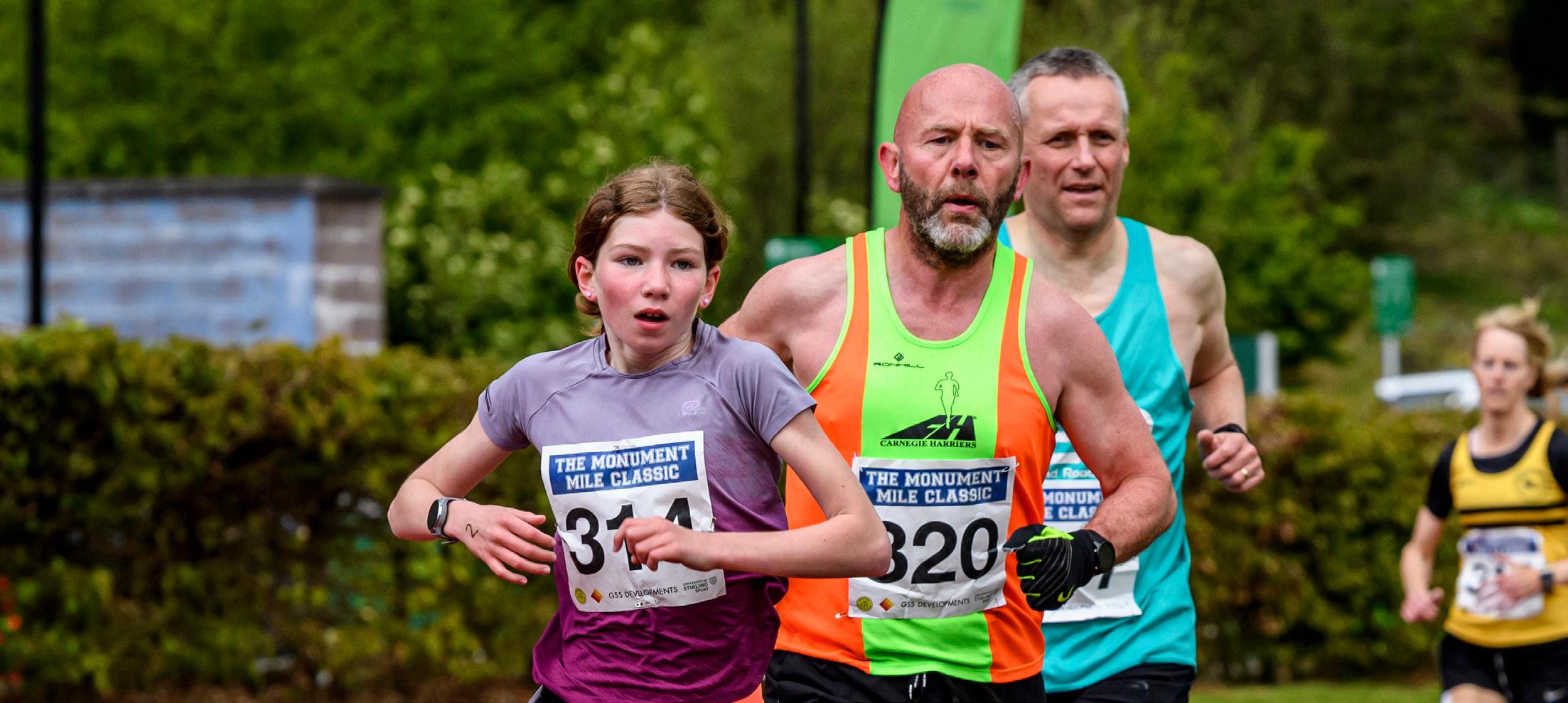
CHOOSE RUNNING (Andjoinaclub) CHOOSE LIFE
 By David McCarthy
Retired policeman
By David McCarthy
Retired policeman
Steve Adam spends much of his time these days playing an Extra in a host of movies and TV shows such as Outlander and The Crown.
The change of career came a little bit too late for a role in Chariots of Fire but a spot of running on St Andrews’ West Sands beach would have been a piece of perfect type casting for the 57-year from Dunfermline.
Steve’s story might not rival that of Eric Liddell but it’s one from which anyone thinking about taking up running but perhaps finds it too daunting can take inspiration.
‘I was that guy,’ Steve said. ‘About eight years ago I was a 49 year old sitting in the stand watching my son James run and train with Pitreavie AC.
‘I knew I was putting on weight just sitting around watching him, so one night I started doing some running up and down a back path behind the Pitreavie Stand when James was doing his session.
‘I was probably two stones heavier than I am now, and it was pretty bad at first. After about 200/300 metres I’d be out for the count!
‘But I started the Couch to 5k and after three attempts at it, I managed to complete it and my first ever race was a 10k, where I just managed to get under the hour for it.
‘“I began to get into it and went along to JogScotland Dunfermline. That was daunting because I thought everybody was going to be very fast and maybe even elitist, but I was welcomed in and grouped with people who were the same speed as me, which I thought was great. You make friends at the same time.
‘Then I decided to join a club and started walking the dog where I knew Carnegie Harriers trained – so I could spy on them from behind a tree to see whether I could cope with it!
‘Everybody seemed quite fast and it was really scary going there for the first time but, again, everyone was brilliant and nobody would be left behind because there would be a loop of some description. People might lap you but it wasn’t a straight line where everyone disappears.
‘The social side was great and it almost became addictive going to training twice a week.
‘In time, my speed increased and for my age, I became quite a good runner.’
No ‘quite’ about it. Steve went from couch potato to a 3 hour 45 minute marathon man in Amsterdam last year and only a hip injury has prevented him trying to dip under 3:30 in Belfast this year. He also won one of the races at the 2021 Monument Mile Classic with 5:47 as a V55 athlete.
‘For the marathon, I’d never gone over 30k in training, so as soon as I hit that distance I was running into the unknown. I’d gone off a bit tentative with a gradual increase in speed over the whole marathon, so I was quite pleased with 3:45,’ he added.
‘But my favourite distances are 5k and 10k . My times are about 19 and a half minutes 5k
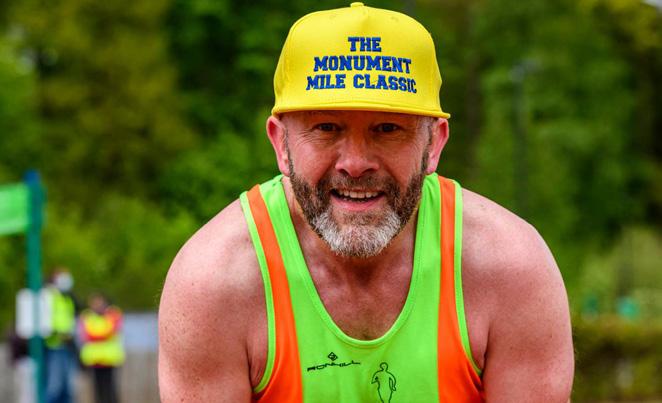
‘Running has changed my life and I’ll be doing it until my body doesn’t let me.’
Steve Adam
and I’ve done a 41 minute 10k.
‘Running has totally changed my life. Seven years ago I was about 15 stones and now I’m 12 to 12.5. My diet hasn’t changed too much, so it is really solely down to running.
‘And James and I have had some great experiences. Last year we went to Lornah Kiplagat’s high altitude training camp in Kenya, where Mo Farah used to go. I was a like a fish out of water, but I loved every minute of it.’
His advice to anyone swithering about taking the plunge and joining a club or a JogScotland group is simple - go for it.
‘It’s the best thing I’ve ever done,’ he insisted. ‘Running has changed my life and I’ll be doing it until my body doesn’t let me any more.
‘I’m 58 in June and I’ve got this thing in my head that I’m going to build up to being a really good V60 runner. There’s a window there when I’ll be one of the young guys in the category, so I want to make the most of it!’
PB 2024 | ISSUE 1 36 Grassroots Athletics Steve Adam


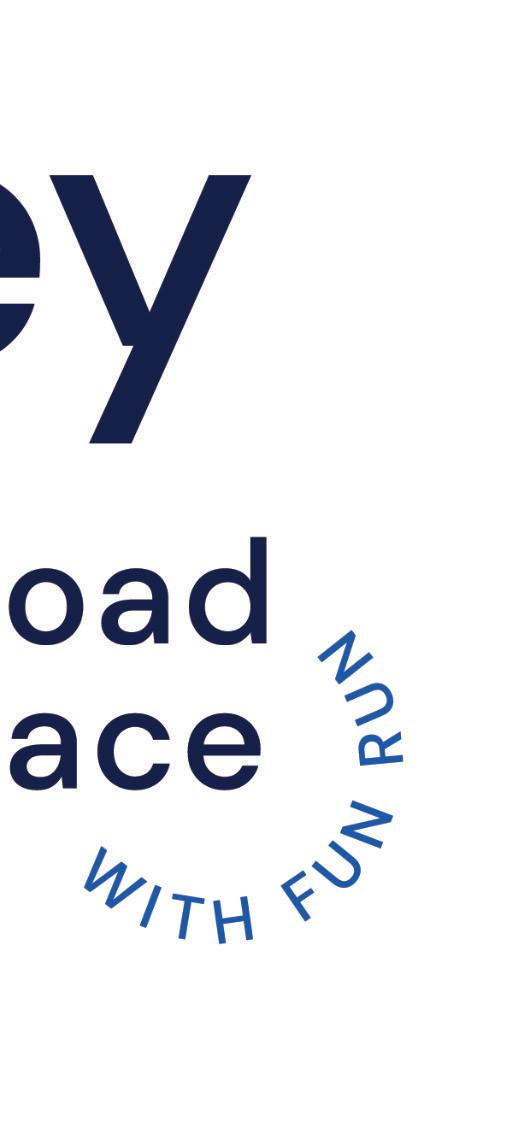


Supported by
Eric Liddell was five years old before he first set foot in Scotland and went to school in England. He died aged only 43 in a Japanese Prisoner of War camp in China.
In between, he became a Scottish athletics icon – via Edinburgh, Hampden and Paris
Written by Colin Shields and edited by Arnold Black.
The son of a family of Scottish congregationalist missionaries, Eric Liddell was born in the North China city of Tientsin in January 1902.
His father had been a draper before becoming a missionary in the 1890s and travelled to China on behalf of the London Missionary Society.
In 1907, with his parents returning home on leave, Liddell was five years old when he set foot in Scotland for the first time. The following year Eric and his older brother Robert went to Eltham College in London, a school for the sons of missionaries, where he stayed for the next 12 years.
Eric entered Edinburgh University in the autumn of 1920 to study for a B.Sc. Degree in pure science over four years.
Within a few months he had been recruited to the University Athletic Club by fellow students, though at only 5 foot 9 and a shade over 11 stone in weight he hardly possessed the build of a budding champion athlete.
In 1921, he made a startling and successful debut at the SAAA National Championships at Glasgow’s Hampden Park. There he recorded the first of his five National sprint double wins between 1921 and 1925.
Liddell was a charismatic athlete with a distinctive, if ungainly style, running with his head back and arms flailing, clearly giving every ounce of effort he could summon.
Spectators loved him for his infectious enthusiasm and many attended sports
meetings purely to see him run.
Liddell was one of that rare breed of men who were talented enough to gain honours when representing their country at international level in two different sports – in his case, athletics and rugby.
He represented Scotland in seven international rugby matches in just 18 months, scoring four tries.
His gospel activities were very important to him and he preached at various venues in Central Scotland as crowds heard him detail his simple faith.
In July 1923, competing for the first time in the prestigious AAA Championships at London’s Stamford Bridge, the 100 yards final saw the Scot trailing after a less than perfect start. But he duly burst past his rivals in the final stages of the race to win in 9.7, a new British record.
Liddell completed an outstanding afternoon’s competition when winning the 220 final in 21.6 and received the Harvey Memorial Cup as the outstanding champion of the year.
When the organising committee of the eighth Games of the modern Olympics at Paris agreed, at a meeting in January 1924, that the heats of the 100m sprint would be held on the first Sunday of the Games, it seemed to the committee members an innocuous decision.
However, it had momentous repercussions for Liddell. As a committed Christian who regarded Sunday as the Lord’s Day and not one on which to compete, Liddell decided not to race in the 100, his best event.
Instead, he switched the emphasis of his Olympic challenge that summer to the 400m, at which he was virtually
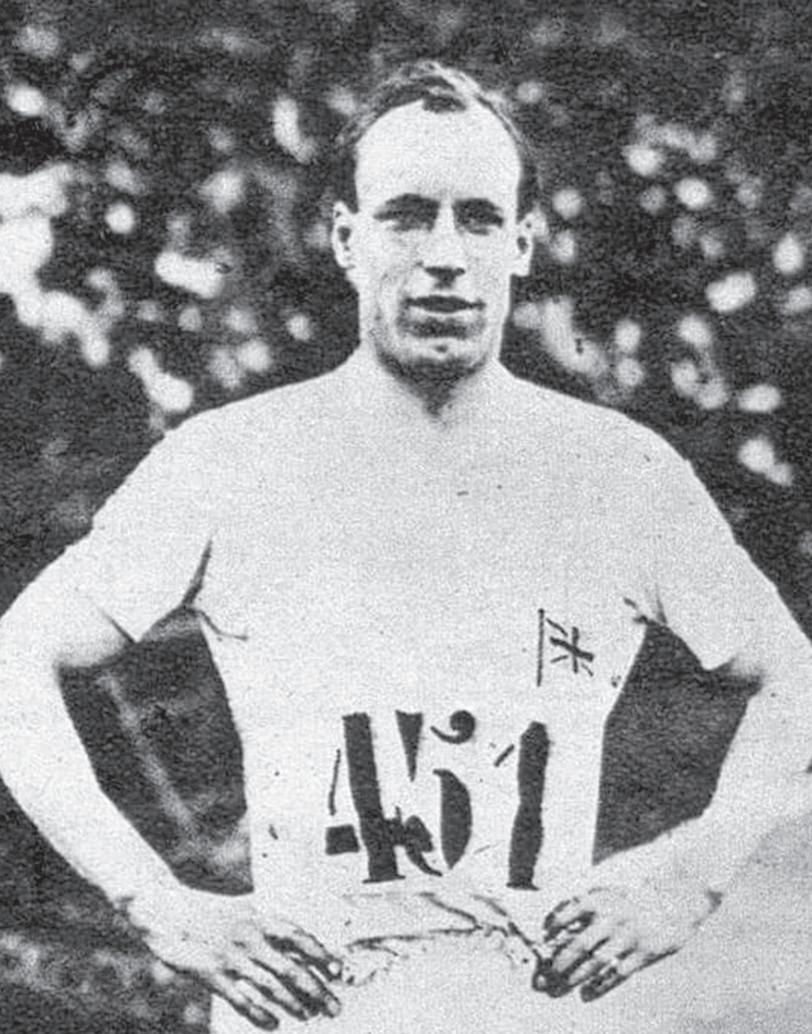
inexperienced at international level, and concentrate his efforts on winning Olympic gold at an event over which he had never broken 49 seconds. The result of this decision was to make Liddell world famous.
For he not only won the event at Colombes Stadium in Paris in the face of the strongest possible opposition but broke the World and Olympic records with a style and panache that amazed the spectators at the track and the running world in general.
Liddell had the satisfaction of not only staying firm to his strongly held faith but of triumphing physically over the world’s best at

PB 2024 | ISSUE 1 38 Eric Liddell Paris 1924-2024
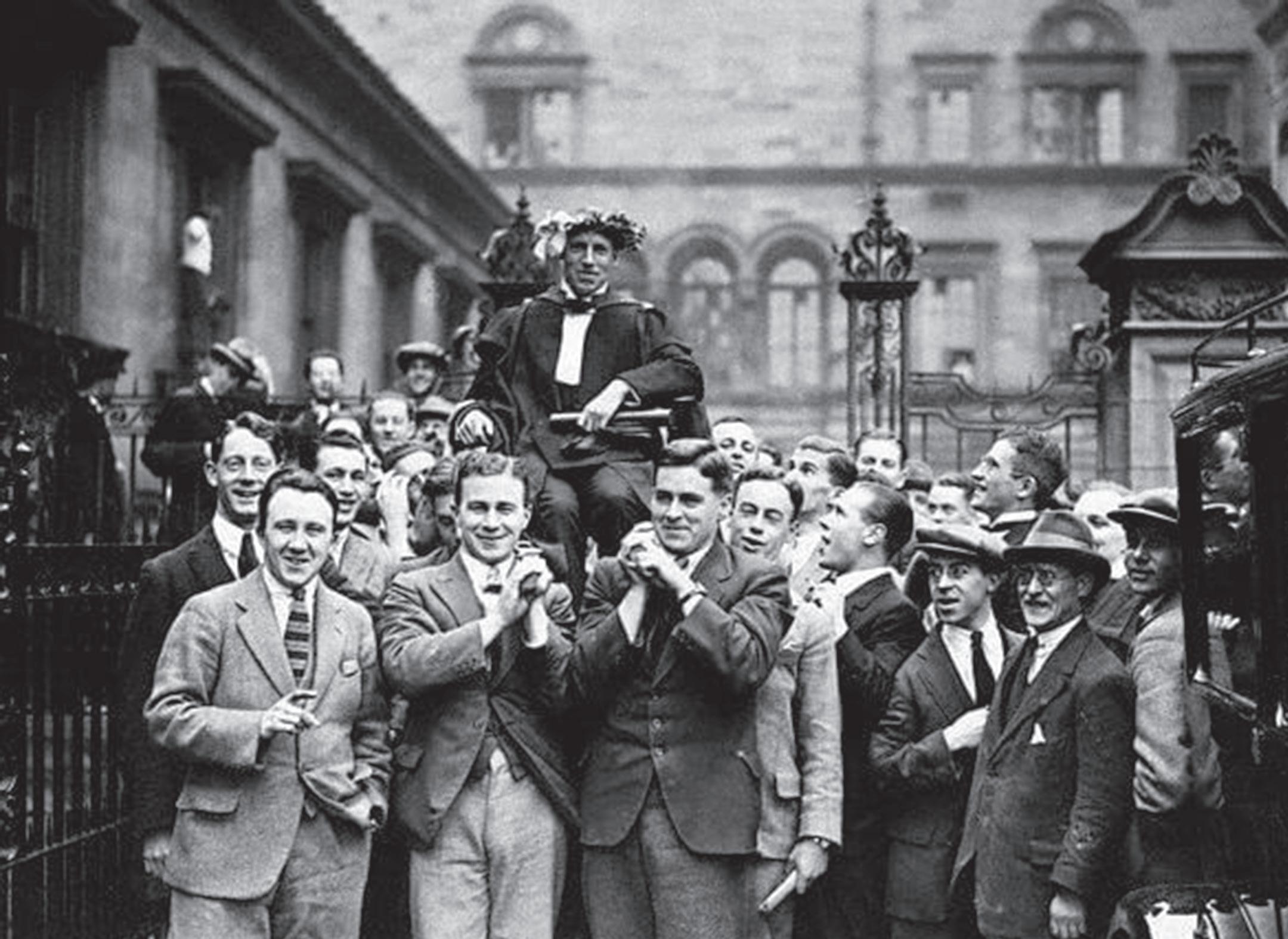
400m at the highest level of competition and establishing a legend that is remembered with awe and affection 100 years later.
Before the 400m event, Liddell won the bronze medal in the 200m in 21.9 seconds. In the 400 final, Liddell was drawn in the sixth and outside of the string lined lanes, and though the least experienced was certainly the fastest sprinter in the field.
Whether lifted by the Bible or the pipe band music, Liddell ran like a man inspired. Utilising all his sprinter’s speed, he covered the first 200m of the one bend race in the startling and unofficial time of 22.2. He was three metres clear of his nearest rival as they entered the finishing straight with the American Fitch, closing slightly.
With 50m to go, Liddell summoned up all his strength and stamina and, with his head back, staring at the sky, knees pumping and arms flailing wildly, he increased his lead over the fading Fitch for a winning margin of five yards at the tape.
Liddell’s time was accepted as World, Olympic, European, Empire and British records. The IAAF accepted the time as a World record until a review in 1928 saw the 1916 run of 47.4 by Ted Meredith (USA), also run on a one bend course but without stringed lanes, for the longer distance of 440 yards being retrospectively accepted as
a performance superior to Liddell’s time.
During the following winter, Liddell prepared for his intended life’s work of teaching and preaching as a missionary in China.
His final season of competitive athletics in 1925 was brief but extremely successful. He recorded a winning sprint treble at the Scottish Championships.
Within weeks of his final race this truly remarkable man left Edinburgh and followed in his father’s footsteps by going to China as a missionary. At the mission at Tientsin in Northern China, he taught Chemistry and English at the Anglo-Chinese College and encouraged the Chinese students in their sporting activities.
Liddell married with Florence Mackenzie, the daughter of a Canadian missionary, in 1934. The couple had three daughters, but when China descended into chaos with the Japanese invasion, Liddell sent his family to safety in Canada as he remained in China.
He switched to rather more evangelical work in the North China plain. There, he suffered privation and hardship as an itinerant missionary, smuggling money hidden in loaves of bread for church work; riding his bike by night tending victims in a typhoid outbreak; and saving a church member, at the risk of his own life, from execution by the Japanese.
In 1943, with 1800 Europeans, he was imprisoned in a Japanese internment camp at Weihsien. He was to die there of a brain tumour on 21 February 1945 aged only 43.
His reputation and fame have transcended time, proving an example to many aspiring Scottish athletes. The Scottish Schools AA award the Eric Liddell Memorial Trophy each year to the athlete achieving the most meritorious performance.
Paris 100m gold medallist Harold Abrahams paid tribute to him.
‘Eric’s name will forever remain as perhaps the most famous and most respected and loved athlete Scotland has ever produced,’ said Abrahams.
‘His style was about as unorthodox as it could be, but the main thing is that he always displayed the greatest courage, and he will be remembered as one of the finest sportsmen who ever donned a running shoe.
‘Eric was a man whose internal spiritual convictions contributed largely to his athletics triumphs. While his ability must have been great, his profound intensity of spirit must have been the vital spur to allow him to achieve so much.’
39 scottishathletics
Liddell Paris 1924-2024
Eric


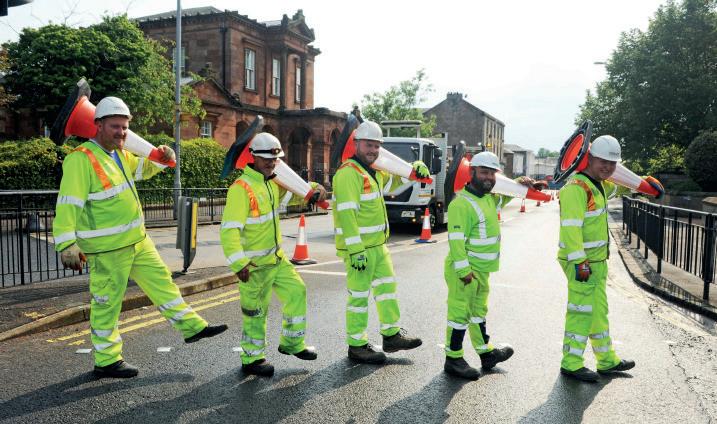
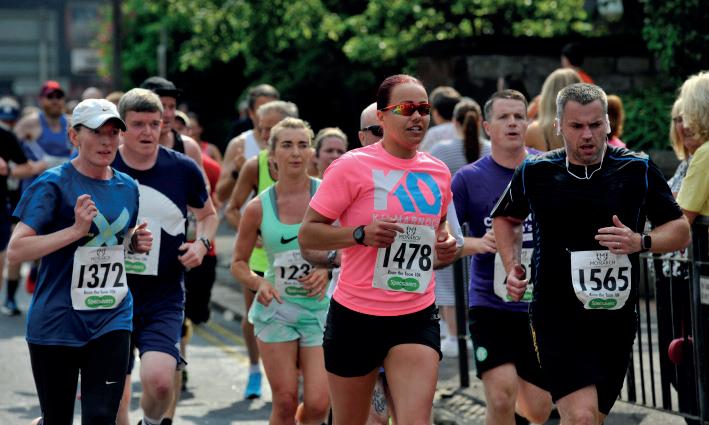
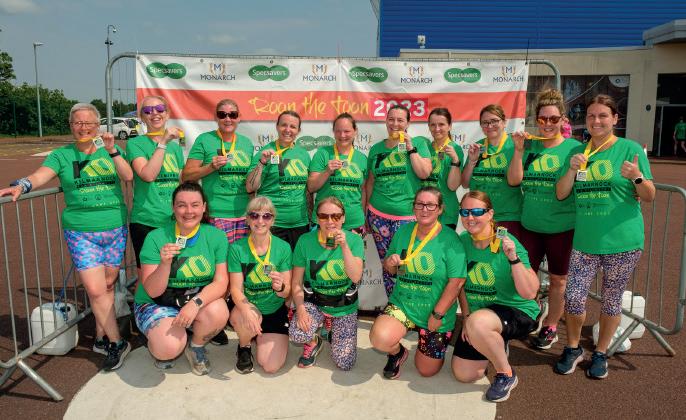






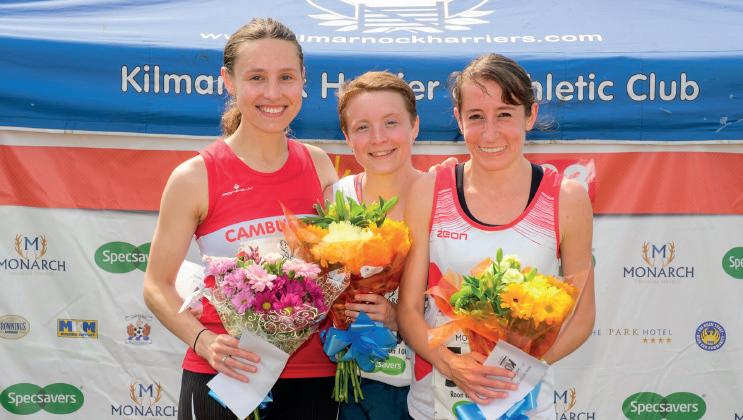


















SUNDAY 9JUNE 2024 FAST, FLAT COURSE • CHIP TIMING • FEATURING SCOTTISH CHAMPONSHIP 10K WHEELCHAIR RACE 10K STROLLER ROLL • £5K PRIZE FUND • GENEROUS GOODY BAG AND MEDAL • SPECIAL CATEGORY PRIZES 2024 SCAN AND ENTER NOW!











 David Ovens Chair Scottish Athletics
David Ovens Chair Scottish Athletics









 By Peter Jardine
By Peter Jardine






















 Photos by Jeff Holmes
Photos by Jeff Holmes























 By Katy Barden
By Katy Barden












 By David McCarthy
By David McCarthy

















































